Balkan Beats



Privilege refers to certain social advantages held by a group in power that arises because of the oppression of others. Within western societies privileges are held by people who have historically occupied positions of domi nance, eg. Christians, whites, and males. But besides religion, race and gender there are many other types of privilege like class, abili ty, sexuality or gender identity.
Owning one or more of these privileges doesn’t ultimately mean your life hasn’t been hard, it just means that for example your skin color or gender aren’t one of the things mak ing it harder.
Since the Green Your Mind project is sup porting disadvantaged groups, the volun teers could become more conscious about the existing inequalities and the unfairness regarding access to resources in society. Vol unteering gave them the opportunity to see other perspectives and through this it’s easi er to recognise their own privileges. Because that’s the tricky thing about privilege. The ones having privileges become so used to it, that they don’t even think about it anymore. In order to become aware of your own advantag es you have to understand the perspectives
of experiencing the oppressive side.
Once you do so, it’s important to acknowl edge it. Becoming aware of your privileges should not be viewed as a burden or make you feel guilty. Instead, it should be seen as an opportunity to learn and be responsible so that we may work towards a more just and inclusive world. Thereby we should always keep in mind that no matter how open mind ed and socially conscious we think we are, we still have old, learned hidden biases that we need to examine. In order to use your own privilege for the good and to be a good ally, you have to be aware of it, listen to people ex periencing the other side and lastly and most importantly speak up. As Benjamin Franklin said “Justice will not be served until those who are unaffected are as outraged as those who are“.
In the following pages you can find a lot of interesting and different articles all dealing with the topic of privilege. The articles are as complex and as diverse as the topic. It rang es from the feminine condition in the Roma community to immigration from the eyes of children up to EU privileges and the white sav iour complex, just to name a few. So be ready for a magazine full of thought provoking articles.
Balkan Hotspot is the EVS (European Volun tary Service) project of “United Societies of Bal kans”, a NGO founded in Thessaloniki in 2008 by a team of active young people.
The Balkans and Eastern Europe are geograph ical regions with many cultural features which offer a broad spectrum of actions and youth involvement initiatives. The organization was created as a response to the pressure of con
www.balkanhotspot.org
stant changes in the Balkan and Eastern Euro pean region and under the need for the creation of a better social environment.
Key areas of the organization’s activities con cern the defense of human rights, the organiza tion of youth exchanges and training courses, which will bring young people from Balkans and Europe together, the organization of local educa tional seminars and multimedia production.
This magazine is distributed free of charge.
United Societies of Balkans is a Non Governmental Organi zation, founded in Thessaloniki in 2008, by a team of active young people. The organization was created as a response to the pressure of constant changes in the Balkan and East ern European region and under the need for the creation of a better social environment. Key areas of the organization’s activities concern the defense of human rights, the organiza tion of youth exchanges and training courses, which will bring young people from Balkans and Europe together, the organiza tion of local educational seminars and multimedia production (webradio, videos, documentaries).
UNITED SOCIETIES OF BALKANS, NGO 8, Delmouzou str., Thessaloniki
Tel./Fax: +30 2310 215 629 | www.usbngo.gr
Main goals of the organization
• To promote the values of non formal le- aring,volunteering, active citizenship and democracy for the creation of a better future for European youth.
• To promote human rights, solidarity and respect for diversity.
• To build healthy cooperation bridges between countries of the Balkan area and that of Eastern Europe with the rest of Europe.
• To locate and multiply the special cultural attributes of our societies.
• The break down of prejudices and stereo- types between Bal kan countries.
The United Societies of Balkans, NGO, does not necessarily share the opinions expressed in Balkan Beats. It is illegal to reproduce any part of this publication without referring to the source.
Privilege for me is first of all linked to the luck of being born in the “right place” of the world and having the opportunity to access educa tion, a fundamental tool that allows you to be aware of the reality that surrounds you and to have critical thinking.
Carolin Kretzer18 years old Germany
Volunteering in Balkan Hotspot

Privilege means a lot of different things to me. When I think of privilege, I think of societal hi erarchy, inequality, injustice, discrimination and oppression. I think about the fact that every thing is interconnected and if you fight against one, its always also a fight against all the other forms of discrimination. I still need to learn lots of things and unlearn lots of bias that result from growing up in a society that profits from keeping these forms of discrimination alive.
 Anna
Anna
Privilege could be having a right to work, health, and life. Privilege could be choosing for your life. Privilege could be being healthy. Privilege could be being part of a community, and privilege could be being out of a communi ty. It’s something that you can’t decide to have and, at the same time, is something that you can choose and fight to change.
24 years old
Privilege is something that everyone should have, but also something that no one should have. Have you ever thought that it is a privi lege to be able to read this? Don’t you think that every moment of our lives is proof that there is someone who is privileged? Compare yourself to your neighbor. Compare yourself to a high class member of society. Compare yourself to a homeless man. Compare yourself to some one in Asia, Europe, Africa. Don’t you see? Priv ilege is everywhere…
Silvia Sanz Linares

Privilege usually comes across as an ill thing, a mean injustice impeding a better world. Yet, it could be perceived in a good light; privilege is power, and power —if used correctly— is a tool to drive change. Maybe, we cannot choose most of the privileges we are gifted with, but we can acknowledge them and use them to even the playing field.
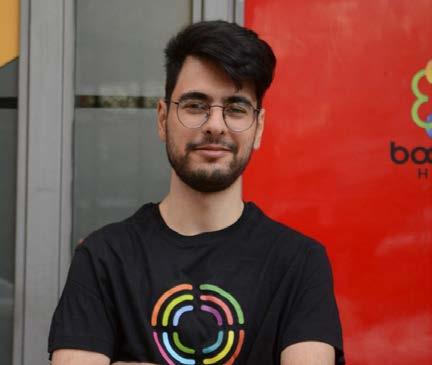 Şahin Akkaya
Şahin Akkaya
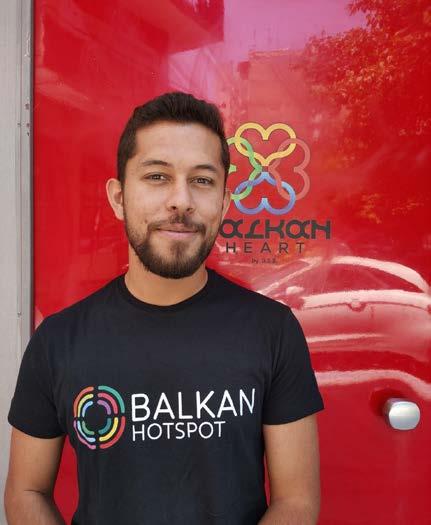
When I think of privilege, I think of talking about restriction of freedom, inequality, poverty, pollution, discrimination... These are just some of the problems of our society. The causes are varied, but it is easier to find a common enemy every day. These are not just because you are, these are the cause of the problems you may face in everyday social life. In short, every discrimination you do not experience, every mistreatment you are subjected to, is a privilege offered to you.

Privilege can be big or small things that make some aspect of your life easier or better than other people’s and that can affect how the world treats you without you having done anything to earn it. Although one of the major features is that it’s the sort of thing we only notice when we don’t have it, after recognizing the ways in which we have privilege, we can use those advantages to help promote equitable outcomes for others.
Ana Beatriz Farinha Yusuf Taskiran22 years old Greece
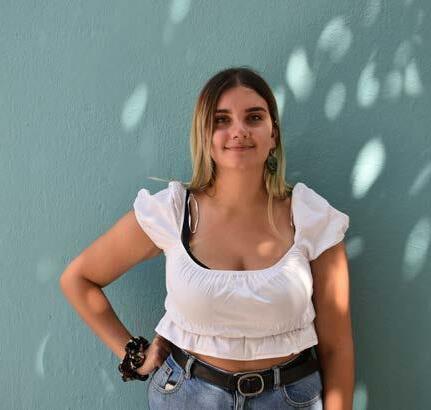
Privilege to me is being lucky enough to not realise you have it. It’s being able to have access to things, goods and services, and feeling entitled to, without realising the difficulty for someone else. It’s important to understand how we are privileged and use that as a tool to help others.
Privilege is the mirror and guardian of power structures. It serves the ones who are already enjoying a certain status and perpetuates inequalities. Privilege becomes then the target of the fight against a world filled with injustices.

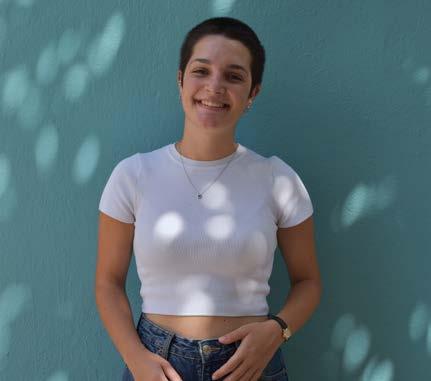
For me privilege is a very relative concept. I am same person everywhere however depending on in which country i am, which job i have, which friend group i am in and so on i might feel very privileged or extremely unprivileged.
Eleni Kapnopoulou ElizabediFor me privilege is a social construction deeply rooted in culture but also in inequality. To be privileged means that some people can have easier access to rights and opportunity while others struggle with discrimination. But we can turn things around and make privilege become a tool to create a more fair society by deconstructing the meaning privilege has.
Lilit Gevorgyan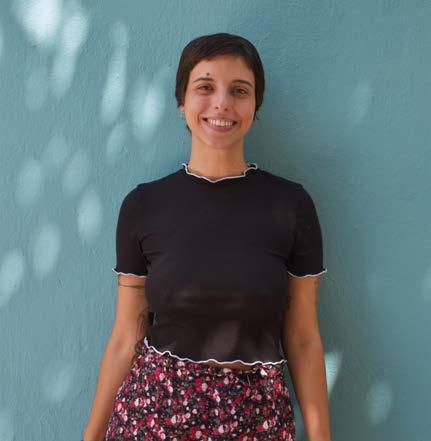
Privilege is being free of discrimination and having more opportunities than others just by belonging to the dominant group. In order to establish equality, we must change our views and treat people’s differences as features.
Madlen Batsiou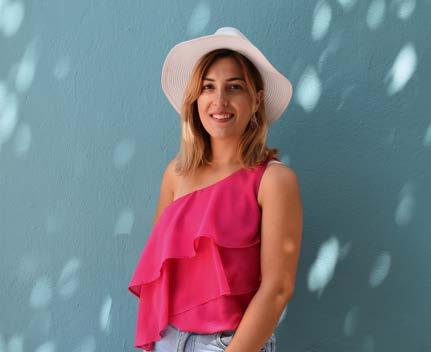
Privilege is many things. But when I think of it, I think of how close we can be to many opportunities, and at the same time how many responsibilities come with it. Acting, but doing it for something good, not the opposite. We should not be taking it for granted. You can’t change a lot of things, but when we can, we must do it in a practical and helpful way. To live with integrity is a difficult path, but not impossible.

Privilege(s) for me is something that you can’t choose but that you can choose to change. You can recognize your privilege, be aware of it and try to deconstruct it every day in your daily routine. Deconstruction is a self responsibility.
For me, privilege means being a part of the ESC project “Green Your Mind”. I consider myself extremely privilaged to be able to travel and explore such an amazing country as Greece. I am so grateful for the experience I’ve had and the people I’ve met during my time here.

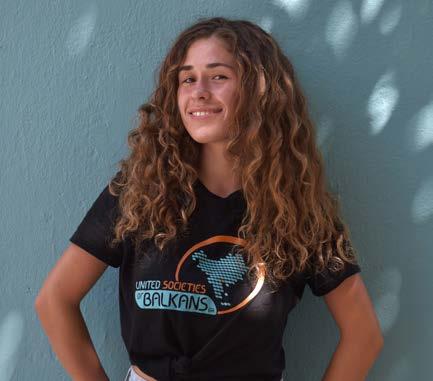

Privilege doesn’t mean that people without privilege are always right and you if you have privilege are always wrong. Privilege for me is a chance to add a few very important things to the puzzle. It is an opportunity to change something for the better.
Tatevik Harutyunyan NanaThe white saviour complex as a remnant of the colonial past that still can be found in volunteering
by Madlen Batsiou, Carolin KretzerWe have all seen this kind of commercial at least once on television. While we are wait ing for the commercial break to end so we can continue to watch our favourite movie, a black child appears on the screen. Thin, weak and barely able to keep their eyes open laying in the arms of their mother who is crying be cause she cannot feed her son. In this scene of despair, a white doctor suddenly appears next to them and consoles her. The doctor takes the baby, feeds him, gives him all the care and support he needs and saves him from the trou bles. Doctors, humanitarian workers and mis sionaries have supported people from African countries for years by providing food and medi cines as well as building schools and hospitals, which however no one has ever asked them to provide nor build. So why did they do it?
The scene depicted in the commercial and the humanitarian aid given by European countries to their former colonies are perfect examples of white saviorism. This form of unsolicited help is deeply rooted in the white man’s ideology of superiority and an old legacy of colonialism,
disguised as a good deed. Between the 1940s and the 1990s the last European colonies were liberated and gained independence. However, after decades of political, economic, social and cultural influence, many European coun tries still upholded their power relations that were technically abolished by the country’s in dependence. By the time the African countries finally regained their independence they were so exploited and damaged by European gov ernance, that they were completely unable to establish a new structure. Left to themselves without resources, they were again dependent on the help of their former colonisers. So what is deeply wrong about all this is not the help it self, but the motives and discriminatory values behind it.
The white saviour complex explains what are the discriminatory values that characterise these actions and defines an ethic of help that is essentially centered on one’s superiority in the action instead of giving the actual long-last ing help that is needed. In fact, a white saviour is defined as an individual who brings help to a non-white individual, starting from the assump tion of being superior to the latter and therefore having the duty to help him. This type of toxic, paternalistic and offensive help is entirely cen tered on the figure of the white saviour. Instead of the person who is in actual need of help, the white saviour is the protagonist of the action giving help to a person who is seemingly de pendent on this help “from above”.
As already explained, this ideology finds its roots in the period of colonialism. Since brutal ly destroying and exploiting foreign countries does not go along with the values of the en

lightenment era, the colonisers established a system of superiority and inferiority of the peo ple. With this, they could easily justify all the harm they did without facing any consequenc es. Now it seemed like all the exploitation and destruction was something really important and in the spirit of good faith. But in actual fact, according to anthropology, you cannot catego rize cultures. The concept of superiority and inferiority can only be applied to for example technology, when a device is more advanced to another or when working with a machine is more efficient and therefore superior to working with hands. This cannot be applied to humans and cultures as there is no way of measuring the superiority of one culture to another.
Can volunteering also become an expression of the white saviour complex?
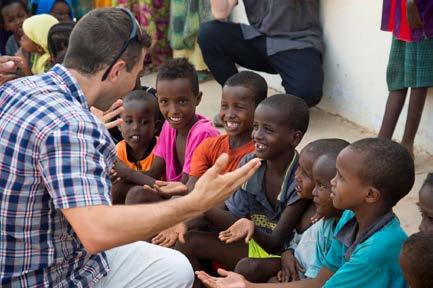
Unfortunately, yes. In recent years, a growing trend to transform tourism into an opportunity to make oneself useful and support the local communities, has led to the complete destruc tion of the concept of volunteering. What is now called “volunteer tourism” is often based on the ideology of the white saviour complex, in which tourists play an active part in the de velopment of the local population of the global south. It exacerbates the existing stereotypes of the underdeveloped, poor countries that are without resources and the ability to improve their situation on their own and which are in
desperate need of the tourist-volunteers, most ly from Western-countries. This type of volun tary service not only prevents populations from self-developing, but also binds them closely to external help, of which they become depen dent. A seemingly endless vicious cycle. But what can we do to break it?
Tourists are not the first ones to be condemned. Motivated by good intentions, they rely on the organisation that makes volunteering a source of profit, which destroys the local social fabric. It is not the genuine desire to support the local population in their self development path that drives the actions of the organisation but rath er the somewhat narcissistic need of the white tourist, who pays to be able to play saving the world in a remote village in the savannah.
“The White Saviour industrial Complex is not about justice. It is about having a big emotional experience that validates privilege.”
Teju Cole
So how can we avoid falling into these false solidarity traps?
First of all it is important to realise this phe nomenon and how it happens. Being aware of the existence of this complex helps to take a first step towards a critical vision of what is being done and the actual reasons behind our actions. Here are 10 things to keep in mind if you want to embark in the volunteering journey in order to stay away from “white saviour” be haviours and become a good ally instead.
1) Educate yourself: Don’t accept things with out criticism. Always do your own research about the historical facts and issues of the country of destination before taking action. Read, read, read and always keep yourself in formed with sources like books, documenta
ries and educational articles. Keep unlearning and questioning because knowledge is power!
2) Allyship: Being an ally may take different forms but the main point of it is to acknowl edge your own privilege and to leverage it to support those who are asking for what they need. It is about educating yourself and taking action to ensure you are not creating spaces where harm can blossom.
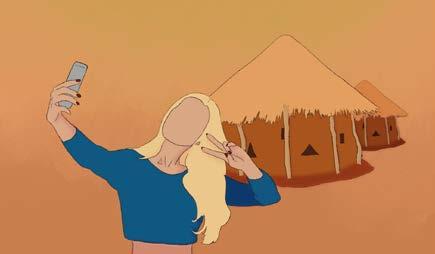
3) Goals and ambitions: Leverage your empa thy to look past conventional hurdles to social change and imagine a world that many would find too ambitious to pursue. Through empathy our actions together can lead to collective visions for our society, which might become a reality.
4) Make your activism more meaningful and strategic. Don’t only join protests and marches, also use your institutional power to change the structures and systems. Action speaks louder than words!
5) Listen: Be an active listener when someone talks about the concerns they might have.
6) Avoid conversations about yourself: Be hum ble. Ask yourself if you are using your privilege to amplify others or if you are drowning them.
7) Connect: Find or build a group of people for accountability. Generate conversations with other colleagues to make sure you are holding yourself accountable and to act with integrity.
8) Challenge your prejudice: Our assumptions and blind biases can be a barrier to understand others completely and their experiences. To examine those biases and prejudices we must challenge ourselves to unlearn our preconcep tions so we can be open to new ideas and up hold a holistic dimensional view of people.
9) Ignoring and avoiding is not empathetic: When volunteering you will meet many different people in difficult situations experiencing hard ship. It may feel more comfortable or like the right thing to avoid drawing attention to it but oftentimes leaning into these difficulties can open the space for healing and understanding.
10) Get to know your community: When you’re directly connected with the community you want to support, more meaningful volunteer ism can be generated. Becoming knowledge able about the people around you or near you places greater value on your acts and will ulti mately lead to a deeper understanding of what is needed and the role you can play.
“Train yourself towards solidarity and not charity. You are no one’s saviour. You are a mutual partner in the pursuit of freedom..” Brittany Packnett
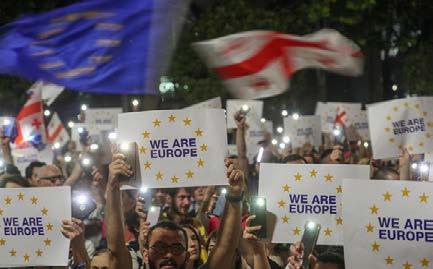
The European Union has always been a desired place for many non-European countries. One EU citizen might ask why? Let me first give you all the privileges that the EU offers to its citizens:
• Freedom of movement across the Schen gen Area

• Visa-free or easy entry to 180 countries, in cluding the USA and the UK
• Living in an EU member country as a perma nent resident
• Working and having a business in the EU
• Owning real estate in EU member countries, renting it out, and profiting from it
• Access to a high-quality health-care system
• Having the opportunity to study in presti gious universities in 28 different countries with free or very affordable tuition fees
• Passing the citizenship to children born in EU territory
• Opening accounts in European banks
• Being protected by the laws of the country
by Nana ZazadzeWhile doing an ESC project in Greece, it be came clear to me as a Georgian citizen what the benefits of being born in EU countries are. Particularly in terms of education. European citizens have the opportunity to study in 28 dif ferent countries. They are free to apply to any university they wish. It’s also less difficult to study abroad for a semester through an Eras mus + program. There are many places in uni versities for EU citizens and very few for nonEU citizens. I recalled a friend from Georgia who was attempting to participate in the Eras mus + university exchange program. She found success and was accepted. However, there is fierce competition among Georgian students. I tried three times with no success. You must pass special exams with the highest possible scores. I’m very disappointed since many Geor gian students study and work extremely hard, yet it’s still not enough.
Another privilege I’ve noticed is the freedom of movement in Europe. While traveling in the Schengen area, EU citizens are not subject to border controls. If they are traveling outside of the Schengen zone, 180 countries require no visas, only an identity card. The situation is completely different for Georgian citizens. For
instance, if Georgians simply want to travel, they must have a hotel reservation and enough money for each day, according to country rules. EU citizens can also easily obtain a work permit in EU countries.
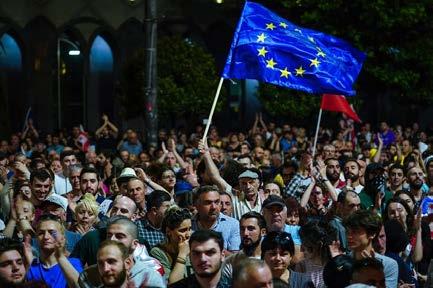
I was also surprised to hear about the healthcare systems in EU countries. The EU4Health program funds initiatives to enhance Union health, fight cross-border health threats, in crease the accessibility and affordability of pharmaceuticals, medical devices, and cri sis-relevant products, and strengthen healthcare systems. Other EU programs also invest in healthcare systems, research, infrastructure, and other health-related areas.
In my country, there is a universal health care program. Emergency services and basic hu man needs are included. Apart from that, med ical and dental care are incredibly overpriced in comparison to European countries. The major ity of people are afraid of going to the doctors because of the cost. I’ve seen many elderly Europeans traveling to Georgia. They are hik ing and exploring the country, whereas people their age in Georgia are mostly suffering from a disease or have countless problems that don’t allow them to travel and enjoy life.
The EU was awarded the Nobel Peace Prize in 2012 for its efforts to spread peace, reconcili ation, democracy, and human rights. It is now celebrating 70 years of peace. Georgians have wished this for a long time. Because we have suffered greatly throughout history as a result of our aggressive neighbor. We had a recent war with Russia in 2008; they are still mov ing our borders, and we are losing land every day. Many Europeans do not understand the emotional pain of having a war in the country and losing friends and family members. They have never seen that, so they have no idea how much it means to us to join the European Union and enjoy our well-deserved peace. In 1999 our greatest politician, Zurab Zhvania, said: მე ვარ ქართველი და მაშასადამე ვარ ევროპელი” - “I am Georgian and therefore I am European.” After 23 years, I still believe this phrase perfectly expresses our identity and be longings, even my country’s faraway geograph ic position, in the South Caucasus region.
Georgia is trying to get candidate status to join the bloc. On 20th of June there was a ral ly in support of European integration saying that “We Are Europe”. Thousands of people gathered in front of the Georgian parliament to express their will to join the European union. Unfortunately we did not get a candidate sta tus but as our president Salome Zurabishvili positively says: “The recognition of the coun try’s European perspective was an incredibly historic step. Now, we’re ready to work with de termination over the next months to reach the candidate status.”
I’m sure that with our enormous desire to be come part of the European Union, we will make a huge progress and achieve our goal.
After all, is it really that easy to stand in the shoes of a woman and have to struggle for a position or a place that is normally held by a man? And as if that was not enough, to make the scenario a little more difficult, imagine having to fight for that position while coming from an ethnic minority.
If in the so-called modern society it’s often con sidered complicated or sometimes too ambi tious when a woman tries to fight for a position or a role normally held by a man, let’s imagine the same scenario for a woman coming from a gypsy community... The truth is that some Greeks excitedly look towards a future of gen
der equality. On the opposite side others are reluctant to certain changes and are steadfast to tradition.
There have been significant recent devel opments in the status of women’s rights in Greece, but although all of these progresses have occurred, Greek women still seem to be at a disadvantage. On top of that, migrant and Roma women are at an even worse economical and educational disadvantage.
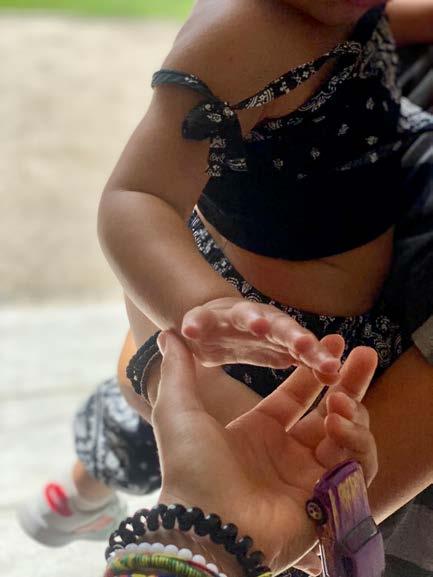
According to the blog “The Borgen Project”, recent data reports that men make up around 70% of Greece’s total workforce and 80% of the country’s Parliament. Many women in the workforce remain in low-income, service, and part-time positions — with only about 33% of part-time positions belonging to men.
According to Eurostat figures, the gender pay gap in Greece comes to 15%, which is actually a little smaller than the European average. Fe male employment has increased substantially since the 1990s: according to the World Bank, the proportion of women among the gainfully employed has grown from 36.1% in 1990 to 43% nowadays.
What challenges can a volunteer face in a new environment-importance of reaching out and working on the issues
by Ana Beatriz Marçal Farinha
The truth is that women in Greece tend to work in low-pay sectors, which have actually grown since the crisis. As a result, because more women than men have precarious jobs, on the whole female unemployment has increased less drastically. Several factors, including the rise of the tertiary sector, increased numbers of women in higher education, gender main streaming in legislation and policies, develop ment of the childcare system and the demise of the male breadwinner model, have contrib uted to the rise of female participation in the Greek labor market.
Although female employment has risen signifi cantly in recent decades, Greece still has one of the largest gender gaps in the EU with regard to labor market participation, unemployment, and wages. It is important to note that issues such as the gender wage gap, discrimination in recruitment and career advancement, sexual
harassment, precarious employment, and vio lations of the labor legislation on gender equal ity are almost silenced in public discourse.
This gender pay gap is considerably higher among Roma population than non-Roma pop ulation. Unemployment rates for Roma women are higher than for Roma men in most of the European countries. The major issues faced by Roma women hindering their participation in the labor market have been identified as lack of education, low levels of employability skills, low income, and participation in informal work.
We all know that the most common stereotype for Roma women is that their purpose in life is bound to the family. A Roma woman experienc es a double ‘stigma’, she is a woman but at the same time she is also a Roma woman, a Gypsy.

There are still many people, including Roma men, who do not understand the feminist agen da and believe it is about dominating and sub ordinating men. First, they have to prove inside their community that they can make it and then, when they are seeking for a job, they immedi ately face negative conduct or are automatical ly excluded for their background. A shocking fact that can prove this reality is that only one in five Roma women older than 16 years are in paid work. This can also be explained by the fact that the typical Roma woman in Greece will spend less than six years in school.
The reality is that a large number of Roma women and girls continue to face multiple discrimination in various areas, ranging from health to employment and education, amongst others. They also have limited opportunities to influence the policies that most concern them. For example, some Roma women are still fac ing sexist, old-fashioned and set views or even
restrictions in career guidance or working life both from the majority population and male community members.
Masculine social values are still prominent within Roma society and culture, although there seems to be a pattern of change. For many years, similar masculine values were equally prominent in the non-Roma groups of several countries before they changed along with the shape of societies. The main victims of the prevalence of masculine values seem to be Roma women, who become the targets of multiple discrimination, both from inside and outside Roma society.
There is still much to be done regarding their em powerment, a lengthy and challenging process.
Education, social entrepreneurship, and train ing are examples of excellent tools for enabling Roma to change their own lives. Empowering Roma women is particularly important as they are less likely than men to have an education or a job, and face difficulties in accessing health care and social services. Involving the Roma community in meaningful ways is essential in achieving this. By increasing Roma’s participa tion in the design and implementation of pol icies, it becomes easier to accurately assess the needs and ensure equal access to im portant services such as education, housing, and healthcare.
The big truth is that the Roma know more about the world outside than the world outside knows about the Roma.

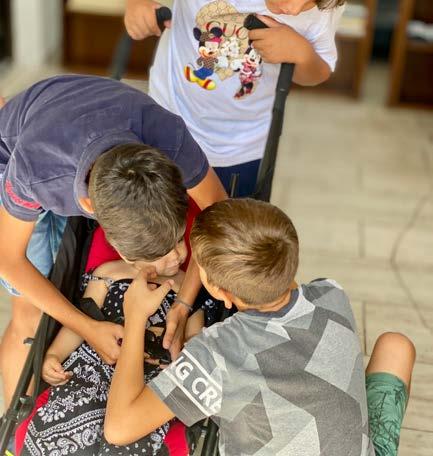
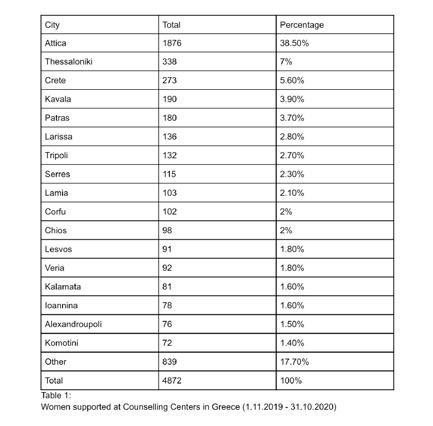 by Anna Bellisario
by Anna Bellisario
After the murder of three women in 48 hours at the beginning of August 2022, the Greek government of Kyriakos Mitsotakis was strongly accused by opposition organisations and groups of civil society demanding concrete measures to combat gender-based violence with the inclusion of femicide as a crime in the criminal code of the Country.
What is Gender-based violence and which measures has taken the country to prevent and combat gender-based violence in the last years?
According to the article 3 of The Convention on preventing and combating violence against women and domestic violence, also called Is tanbul Convention Istanbul, gender-based vio lence is: “a violation of human rights and a form of discrimination against women, including all acts of violence based on gender which cause or are likely to cause harm or suffering of a physical, sexual, psychological or economic nature, including threats of such acts, coercion or arbitrary deprivation of liberty, both in public and private life”.
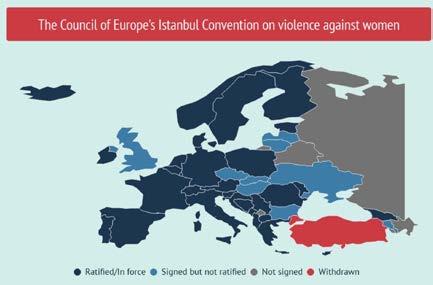
The Istanbul Convention is certainly a point of reference at the international level for combat ing violence against women and it was adopted by the Committee of Ministers of the Council of Europe on 7 April 2011 and opened for sig nature on 11 May 2011 at the 121st session of the Committee of Ministers in Istanbul. The Convention entered into force in 2014.
This is the first international legally binding in strument which defines the forms of violence against women and designs a comprehensive legal framework,policies and measures for
Source: https://www.coe.int/en/web/istan bul-convention/text-of-the-convention
Source: 1st Annual Report On Violence Against Women by the General Secretariat for Family Policy and Gender Equality
How has the phenomenon evolved in recent years?
preventing and combacting violence against women, protecting the victims and ending the impunity of the perpetrators.
Greece ratified the Istanbul Convention under the Law 4531/2018 and it entered into force in October of the same year. However, in the country there is no specific law on violence against women but only some specific forms of violence against women such as rape, sex ual assault and domestic violence are covered by the criminal code.
The General Secretariat for Family Policy and Gender Equality GSFPGE is actually the govern mental agency competent to plan, implement, and monitor the implementation of policies on equality between women and men in all sec tors. Since 2010 the GSFPGE has developed and continues to implement the National Pro gramme on Preventing and Combating Vio lence against Women.
In particular, in 2010 has been created for the first time a comprehensive Network of Struc tures for preventing and tackling all forms of violence against women which includes:
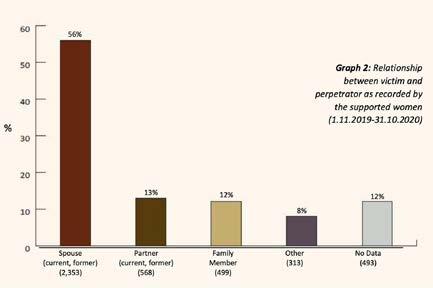
The national SOS 15900 24-hour helpline which operates 24/7, 365 days a year and provides counseling services in both Greek and English; - 42 Counseling Centers throughout the Coun try where victims of gender-based violence can receive the following services: updates and information on gender equality, combating vi olence and multiple discriminations against women; social, psychological, legal and em ployability support (using a gender lens); refer ral or accompaniment services when necessary to Women’s Shelters, police and prosecution authorities, courts, hospitals, health and men tal health centers, social services for welfare or other benefits, to structures for the promotion of employment and entrepreneurship and to struc tures for the protection and support of children, le gal aid, in cooperation with bar associations;
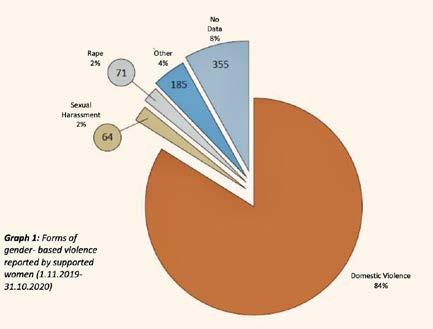 Source: 1st Annual Report On Violence Against Women by the General Secretariat for Family Policy and Gender Equality
Source: 1st Annual Report On Violence Against Women by the General Secretariat for Family Policy and Gender Equality
Source: 1st Annual Report On Violence Against Women by the General Secretariat for Family Policy and Gender Equality

20 Women’s Shelters which provide ac commodation and food to women victims of gender-based violence and their children, psychosocial support, occupation and legal counseling services via the Counseling Centers and also facilitate access to health services and school enrolment.
In Greece is currently into force the Nation al Action Plan for Gender Inequality (NAPGE) 2021-2025 which is organized around four priority axes, each spotlighting a specific the matic dimension of gender equality policies.
The theme of preventing and eliminating so cial stereotypes, prejudices, and discrimination is integrated and highlighted in all four priority axes and in all thematic policies, objectives, and actions. The priority axis 1 aims to eliminate gender and domestic violence, the priority axis 2 involves equal access to leadership positions and decision making roles, the priority axis 3 promotes equal participation in the workplace (labor force), and the priority axis 4 promotes gen der mainstreaming in sectoral policies.
The evolution of gender-based violence in Greece through the annual reports on violence against women by the General Secretariat for Family Policy and Gender Equality
The 1st Annual Report On Violence Against Women elaborated by the General Secretariat
Source: 2nd Annual Report On Violence Against Women by the General Secretariat for Family Policy and Gender Equality
for Family Policy and Gender Equality (GSFPGE) is the first attempt to comprehensively present the phenomenon of violence against women in Greece and to reflect the actions implemented at an institutional level regarding the preven tion, combating and elimination GBV.
The framework on gender-based violence pre sented by the same report is based on data analysis from the period November 2019-Oc tober 2020, using the database of the Hellenic Agency for Local Development and Local Gov ernment (EETAA) and the database kept by the 15900 24/7 SOS Support Helpline.
According to data reported, during the period November 2019-October 2020, the Counseling Centres of the GSFPGE Network throughout Greece provided support to a total of 4872 women victims of gender-based violence and multiple discrimination, as well as to third par ties (i.e. mother, adult daughter of the victim).
In particular, for all eleven reference months the region of Attica was the one with the high est percentage of supported women by the Counseling Centers amounting to 38.50%. The city of Komotini, in Thrace, registered instead the lowest percentage of assisted women amounting to 1.40%
In addition, data show that in the period No vember 2019-October 2020 the most common

form of GBV was domestic violence amounting to 84% of the total reported cases of all forms of GBV in the Counseling Centers throughout Greece. Sexual harassment and rape followed with 2%, Other forms of GBV was amounting to 4% while 8% was without data.
The relationship between the victim and the perpetrator was mostly spousal (current and former) amounting to 56% as well as by part ners (current and former) amounting to 13% while 12% of the total women victims of GBV who received support by the Counseling Cen ters of the GSFPGE Network of Structures re ported that the perpetrator was a family mem ber (i.e. brother, father, or other relative).
As for the age groups of the women victims and third parties who received specialized support services at the Counseling Centers of the Network during this period the highest per centage were women between 36-45 years old amounting to 29%. The age groups of women 26-35 years old and women 46-55 years old were 19% of the total respectively. The 9% of the total were young women below 25 years old. Women over 60 years old were 8%, while
11% of the total didn’t provide information re garding their age.
It’s important to remember that in Greece, the word femicide began to be the focus of pub lic debate only recently after a murder case in 2018 involving Eleni Topaloudi, 21 years old, who was brutally raped and killed on the Greek island of Rhodes and for how it was handled by the prosecutor to whom it was assigned.
In addition, the attention to the phenomenon has increased with the arrival of the #MeToo movement in Greece and the increase in cases of domestic violence during the lockdown.
The data in the following table shows that in 2020 as in 2019 8 women were murdered in Greece by a member of their families, while in 2018 the murders of women by a member of their families amounted to 13.
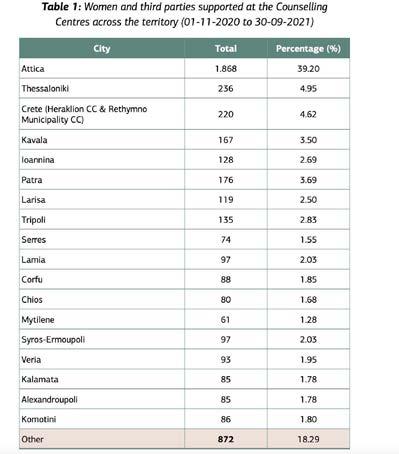
Specifically, for 2020 the percentage of fe micides by a family member of the victim amounted to 44.4% while out of the 18 murders with a women victim femicides amount to 8. Instead for 2010 the percentage of femicides by a family member of the victim amounted to 33.3% while out of the 33 murders with a wom en victim femicides amount to 11.
During the reference period November 2020-October 2021, the CCs of the GSDFPGE Network throughout Greece provided support
Source: 2nd Annual Report On Violence Against Women by the General Secretariat for Family Policy and Gender Equality
Source: 2nd Annual Report On Violence Against Women by the General Secretariat for Family Policy and Gender Equality

Source:
to a total of 4767 women survivors of violence and multiple discrimination (4359), as well as to third parties (408) who mostly received use ful information.
For all eleven reference months the region of Attica was the one with the highest percentage of supported women by the Counseling Centers amounting to 39.20%. The city of Mytilene, in Lesbos, instead registered the lowest percent age of assisted women amounting to 1.28%
The most prevalent type of GBV, with reference to the period November 2020-October 2021, was domestic violence amounting to 85% of all GBV reported cases, followed by 3% for sexual harassment cases and 2% for rape cases. Oth er forms of GBV was amounting to 4% while 6% were without data.
The relationship between the survivor and the perpetrator was mostly spousal amounting to 58% and intimate amounting to 15% while 11%
concerned another family member (i.e. brother, father, or other relative).
As for the age groups of women survivors of GBV who received specialized services at the Counseling Centers of the Network during the reference period, the highest percentage amounting to 29% were women aged between 36-45 years old, followed by the age groups be tween 46-55 years old amounting to 21% and between 26-35 years old amounting to 20%. The 9% of the total were young women below 25 years old, 5% of women belonged to the age group of 56-60 years old, while 8% of the total were women over 60 years old. The remaining 8% of the total women survivors didn’t provide information.
Comparing the data reported by the two an nual reports on violence against women elab orated by the General Secretariat for Family Policy and Gender Equality, with reference to the periods November 2019-October 2020 and November 2020-October 2021, it emerged that
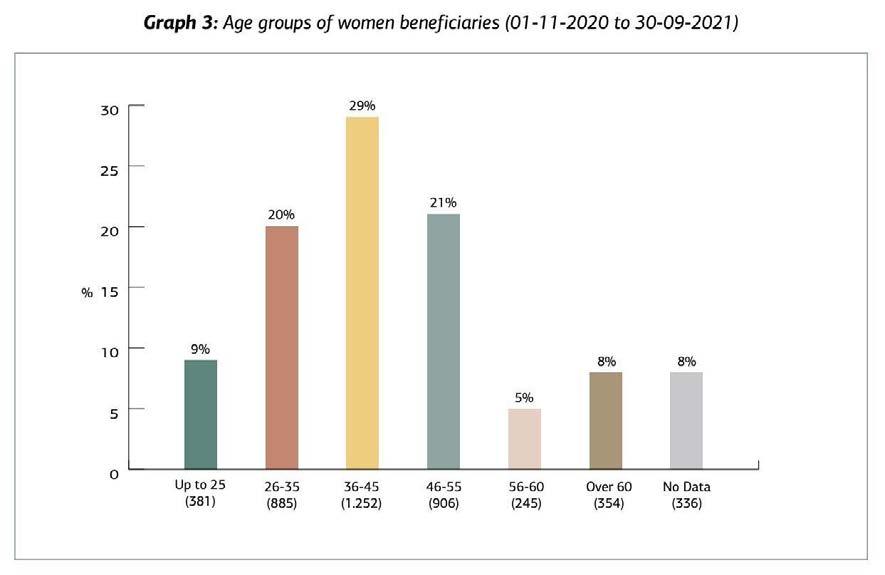
the most prevalent type of GBV was domestic violence with a percentage that has risen from 84% up to 85%.
In addition, data showed how the relationship between the victim and the perpetrator was mostly spousal (current and former) amounting to 56% during the period November 2019-Oc tober 2020 and 58% for the period November 2020-October 2021.
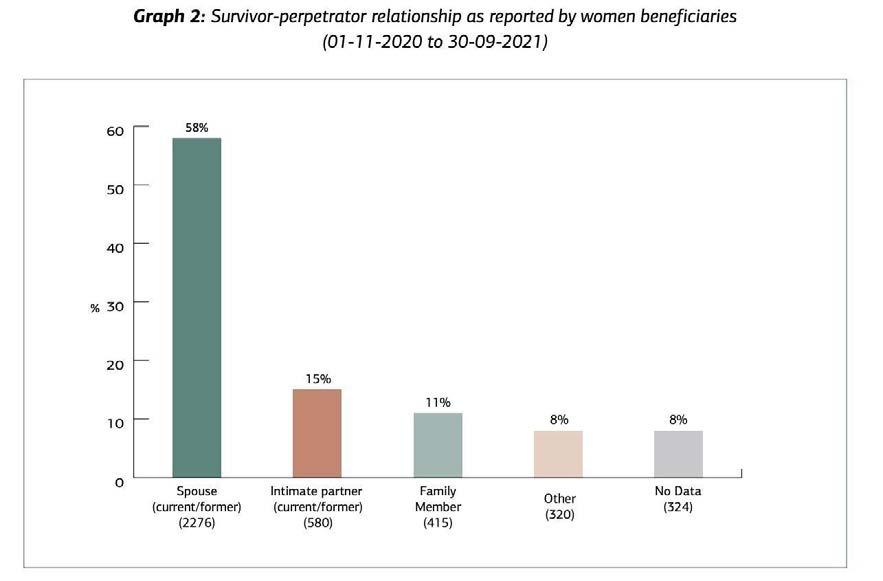
About the age groups of the women victims and third parties who received specialized sup port services at the Counseling Centers of the Network during the reference periods the high est percentage were women between 36-45 years old amounting to 29%.
Despite significant efforts made in recent years by the institutions to combat gender
based violence, the greek society remains mainly patriarchal with women who continue to be severely discriminated against and abused.
In this context, the inclusion of femicide in the penal code remains the most effective instru ment to prevent and contrast GBV and also to facilitate monitoring of this phenomenon and finding adequate measures for its prevention, quick responses, adequate investigation and the prosecution and punishment of perpetrators.
As lawyers said this action would be the most important misure to prevent the perpetrators of crime from having reduced penalties and also to be able to justify themselves as innocent by saying that they were suddenly overcome by emotion that justified murder.
Meeting another woman, listening to her sto ry, her values and her traditions gave me the chance to understand which position I have as a woman in the world and how the other wom en are living their lives in a completely different way to mine. I can say how lucky I am, but also I can understand that only one meaning of luck doesn’t exist. Thanks, Georgia, for changing my perspective, opening my mind, and also al lowing me to realize that every woman starts a fight to reclaim herself in a moment of her life.
The topic we chose for the magazine is “Priv ilege”, and since we took that decision I start
ed to think about this word and reflect. The questions that came in my mind were different: What does it mean for me to have privileges as a young woman? Do people from other coun tries have different privileges? Do women from other countries have different privileges?
Days pass by as normal and we never stop to think about it. We don’t realize that maybe we are lucky, we are free, we have privilege just be cause we live in a different country, we have the support of our family for our choice or simply because we go out with friends to drink a beer or just for a walk.
Now that I’m living in Greece, I had the chance to meet a lot of new realities, including the one of the Roma community.
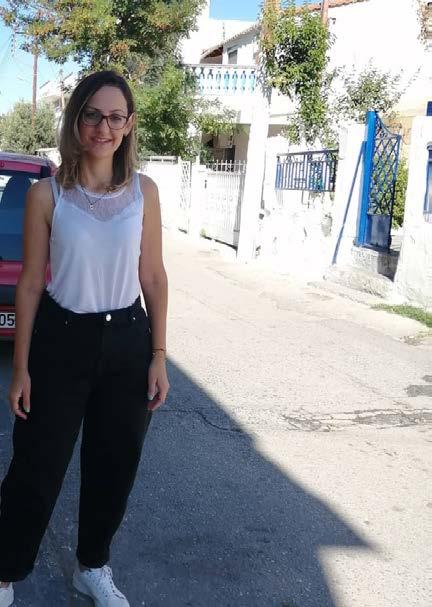
The first impact in Dendropotamos (the Roma community’s neighborhood) was very strong and soon showed me the differences between men and women.
Even if it’s a neighborhood close to the city center, it seems like you are in another city.
That’s why I decided to meet a girl from there, Georgia. She is the first woman to be a role model for the community: she helped women to understand that they can live in a different way outside this very traditional and stereo typical pattern, that they have the chance to choose by themself which type of life they want to live. Unfortunately, not all of them perceived what she did in a positive way, looking at her as a threat or an example to avoid.
It was an amazing conversation with two young women, from different countries, with different traditions and different lives, but with something in common: being a woman!
Being a woman means, in most situations, be ing unprivileged. Unprivileged in rights, unpriv ileged in the workplace, unprivileged in tradi tions. Every day and in every part of the world, a woman is fighting for her rights, to claim her position in the world, to change deep-rooted traditions and to break the rules that see her as the main character without privileges.
“ Living together means that one helps the oth er, so the change becomes easier. Roma are heavily marginalized in society, which means that further they are from the city, the easiest is to be a close community because you protect your community by keeping your traditions. This impressed me a lot because of how dif ficult it was for me even though I have friends, not Roma, and I had chosen my life outside my community, and at last, I came back because this tradition is so deep in me. Even now that I’m a single mother, I have my job, and I’m in dependent, I have to admit that it is difficult for me to continue my life with someone else be cause I’m a mother in the Roma community.”
What is the condition of the women in this community? What was in the past, and how has it changed now?
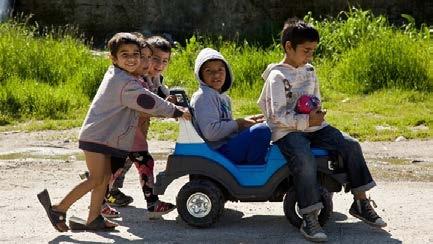
First, it is a close community that still retains many traditional characteristics. It could be compared to a small village in the ‘50.
The purpose of women is to get married, pref erably at the age of eighteen, give birth, take care of the house, and raise children. Further more, a woman has to be a virgin when she marries. I grew up with this “law”, with the idea that when I would have sex with someone after, as I had to marry him. The virginity of the girl is not only her pride or her ethic but is also the pride and the ethic of the man who will marry her and of all the family, especially the father. He can say: “I raised a girl with ethics, so I am a good family man if I give a daughter virgin to her husband”. Virginity is also the husband’s pride because it means she will never have sex with another man except him. Virginity means “You possess me”.
What could happen if a woman has sex with someone before marriage?
Today, some girls have sex before their wed ding, but they are stigmatized badly. Sexual freedom in the Roma community could happen after the first divorce because if you were mar ried, it means that you are no longer a virgin. So if you remarry, no one expects you to provide proof. For this reason, you are “free to live your sexuality”. Otherwise, if they discover you have a boyfriend, you lose your freedom.
© https://greekreporter. com/2022/04/08/roma-people-greece/
I didn’t have a legal marriage, but I had the tra ditional one because it was so clear for me, for him and our family, that once we had sex, he was my husband and I was his wife.
Even if I was not ready to get married, even if I was at university, I had to follow all the tradi tional ways.
Does the father have to find a husband for her daughter?
In my community now, not anymore. There are cases, but in general, no. In other more tradi tional communities, they arrange marriage at a younger age, for example, at 5 years old or sometimes when women are pregnant. The mother of the boy could also bring a jewel for the baby girl’s birth because they are engaged from that moment.
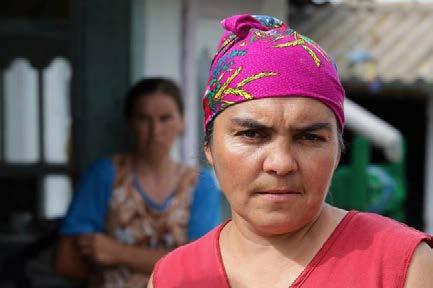
After marriage, could women work or go to school?
Here come all the problems. Fifteen years ago, it was more difficult for a woman when she got married to go to work. Now, you could decide
for yourself, but you should take into account the world around you (your mother, your father, your grandmother).
I was lucky because I had the support of all my family, not only from my mum but also from my father, who is more open-minded than other men in the community. So I think it is a privilege to have open-minded and supportive parents.
How did you decide to study and continue your education?
When I was 14, my grandmother decided that was the best age for me to get married and also, there was a young boy (24) from a good family, so it was the best chance for me. I thought I didn’t want to embarrass my fam ily, and I accepted the situation. So I tried to meet this boy, even though I didn’t want to be touched. I wanted to show my family that I tried to respect their rules, but after a year, I felt op pressed and talked with my mother. She also spoke with my father, and they supported me against my grandmother.
For me, it was not something to decide. It was so clear to continue my studies. There was no reason to stop. My husband understood that if I could choose between university and him, I would surely choose the university. My mother was supportive and, in a way, my mother-in-law because she saw that I was determined and told her son that if he wanted me, he had to let me continue studying.
I felt more powerful when I returned to universi ty as a postgraduate student. After graduating © https://borgenproject.org/greek-roma/
in 2012, I decided to take care of my family, but I understood that I would do something more. That’s why I decided to return to university be cause, until now, it was the place where I could breathe and find myself. I knew that I could do it like many women, even if I had a family. I tried to pass the exam three times, but the year before entering university, I was passing a very bad period. I was trying to find my balance: I was living away from the university, I was living far from my friends that were doing different things, I was more focused on my family, I was more focused on my own life, I was more close
to people that were thinking traditionally, I was more affected in tradition, and I was thinking to have a second child. So I had to choose be tween a second child or a master’s degree. My husband encouraged me to try the exam but, at the same time, tried to convince me to extend our family, even if we were fighting a lot during this period. He and his mother thought that a new baby could solve our problems. Coming back to university could mean that everything could become worse. But I continued on my way, and now I also have a master’s degree.
What is the role of the older women, the grandmothers?
In the Roma community, women have no pow er at all until their son gets married. From this moment, a matriarchy starts because she is the woman who gave birth to the family’s lord. It’s like the Ottoman times: the king’s mother is the kingdom’s most powerful woman, and you should obey.

The grandfather is a respective person in the society but is not the head of the family any more because his son is the new king. So he doesn’t take decisions anymore, his son makes them.
The interesting paradox is that the patriarchy comes from women. It’s what we call internal ized patriarchy. It means that this is how things have been done in life. If you are a woman in the Roma community, you have to accept that, at the beginning of your life, the father decides everything for you. Then, at some point, you be Roma community’s woman
come a mother and your son, when he will be the head of the family, you will have the power.

How is the reaction of a woman that has only daughters?
From my experience, a mother stuck in tradi tion, even if she has a girl or a boy, will destroy their lives because they will be unhappy due to the fact that they could not have a choice by themself. The only way for children is to follow the law of traditions. They love their children, but it is a toxic, deformed way of love.
Parents beat their children if they don’t follow the elders’ words. For them, sons could be hap py only if they obeyed the community’s tradi tions and rules.
If you were born as a woman, does it mean you will be unhappy?
In a way yes, in another way, you can feel ex tremely lucky. Maybe you feel happy just be cause you don’t know what happiness is. It depends on the concept of happiness for you: if you were born in this type of community and, so, in this type of mindset, this is the type of happiness for you. You can not imagine some thing different because you are being born as a child, you know your role in life, that’s why you are happy if you follow your role.
For example, you couldn’t dream of becoming a teacher because girls don’t study. This is some thing that I used to listen to my grandmother.
When I was reading at school, she always told me: “You are reading again. What do you want to become? A teacher?”. That’s because at the age of 14 or 15 you have to be married, all of my friends were.
But after 6 years, when my sister went to uni versity and had to pass her exams, the same woman (my grandmother) tried to help her study.
You decided to separate from your husband. What was the reaction of your family and your community?
Yes, it was my decision, and I had the support of my family because they saw that I took the choice for serious reasons. They could say: “ok, you should not get divorced, because you will embarrass us. Furthermore, you are a woman, you are a single woman with a child, and what would people say?”. They never said anything like that; instead, they were very supportive, helped me, tried to give all the good examples, and sup ported me to continue my life and be happy.
Not everyone can react in the same way. There are parents that can say: “This is your husband for life!”.
There are cases where a woman is beaten, and if she goes to his father saying that she is mis treated and abused and wants to get out of the marriage, the father can answer: “No, it’s your husband, you should keep the family”.
The father could discuss with the man by ask ing him what he is doing with his wife, suggest ing him to stop, but he couldn’t support his girl becoming a single mother. Or even, in the best case that the father agrees with the divorce, he will be very restrictive and soon find another husband for her.
Once a woman has children, she should focus on her children and never get married again.
Sometimes I was accused, especially by my husband, of putting myself and my career be fore my family, but I was trying to prove to all and to myself that I could combine everything. I can keep the traditional values and the tradi tional way of life, and at the same time, I can do whatever I want and be a modern Roman woman.
Fortunately, half of my community supports me to continue my life as a single mother. This could be considered a privilege because no one accepted such a decision a dozen years ago. So things are changing, and when they see a woman with the ability and strength to contin ue her life and be economically independent and respect the values that she gained from her family, they support her.
It’s kind of a revolution in your life and in your family, isn’t it?
For me, it was something normal, maybe for the community, yes, it’s a revolution.
I don’t feel like a revolutionary. I think that it was just me!
Social entrepreneurship focuses on social issues such as poverty alleviation, women’s empowerment, protection of women’s and chil dren’s rights, environmental issues, treatment of waste products, social inclusion of vulnera ble groups - in short, overcoming privilege and bringing about positive change in society.
But what is “privilege”?
Some of us are exempt from social attitudes that plagues other people connected with their race, ethnicity, gender, sexual orientation, sex, disability, educational backround, physical ap pearance, religion, age, class.
Natural disasters, wars, famine, epidemics, global warming etc., exacerbate this problem and create additional difficulties for some peo ple making them refugees, unemployed people, non-native speakers, poors. These problems are challenging governments and corporations, and they never can solve all these problems.
I believe that social entrepreneurship is one of the ways to alleviate these problems.
Social entrepreneurship is all about recogniz ing the social problems and achieving a social change by employing entrepreneurial princi ples, processes and operations.
by Lilit GevorgyanIt is all about doing research to completely de fine a particular social problem and then orga nizing, creating and managing a social venture to attain the desired change. The change may or may not include a thorough elimina tion of a social problem. It may be a lifetime process focusing on the improvement of the existing circumstances. 1
In 1990s has been implemented a new con cept of business management, which strive to uphold the ideals of people, planet and profit (sometimes described as “people, planet and prosperity”). That places value on social and environmental responsibility as well as the company’s bottom line.
Social entrepreneurship focuses on social issues such as poverty alleviation, women’s empowerment, protection of women’s and chil dren’s rights, environmental issues, treatment of waste products, social inclusion of vulnera ble groups - in short, overcoming privilege and bringing about positive change in society.
These entrepreneurial leaders operate in all types of organizations, large and small, new and old, religious and secular, non-profit, for-profit and hybrid. These organizations com prise the ‘social sector’. Profit making is an as pect of this concept but it may not be the sole
1 What is Social Entrepreneurship, Prachi Junela, 2015 https://www.managementstudyguide.com/socialentrepreneurship.htm
purpose of the organisation. After all entrepre neurs need capital to carry on with the process.
Business is the driving force for the econo my, Social Entrepreneurship is the same for social changes.
Differences in Business and Social Entrepreneurship
Business Entrepreneurship / Social Entrepreneur ship
More about the individual / All about collective efforts for society
Aims at producing goods and services / Aims at producing goods and services that can serve the community and solve a problem
Focused on the market, demand and trends/ Focused on a solution-oriented approach to a social problem
Measures performance according to profits /Measures performance according to the im pact made
The purpose is to satisfy customer needs, ex cel and earn profits. / The purpose is to pro mote their cause and improve the society
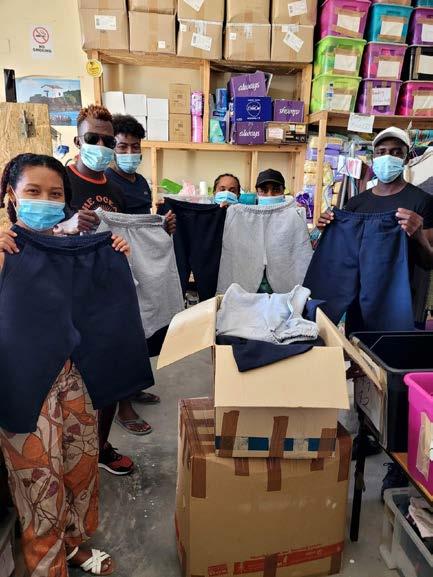
“
Social entrepreneurship aimed at identifying opportunities that are aimed at increasing so cial wealth. Compared with the business, which aims to make products and services for people, social entrepreneurship goes further to look at the need to foster a lasting tackling of the prob lem at the socio-cultural level. 2
It is estimated that there are around 690 regis tered EU defined social enterprises in Greece, established according to the three institutional ized forms of social enterprise. However, not all registered enterprises are actually operational (it is estimated that only 30 to 50 per cent of the registered Koin.S.Ep.s are actually operating).3
Naomi: The social component of the organization
NAOMI (Ecumenical Workshop for Refugees in Thessaloniki), is a non-profit social organi zation founded in 2016, aiming to support ref ugees and asylum seekers in Greece for their socioeconomic integration.
2 How social entrepreneurshi p is changing the world, 2021 https://www.isdm.org.in/blog/how-social-entrepreneurshipchanging-world/?utm_source=adwords&utm_ medium=grants&utm_campaign=social_entrepreneurship_ blog&utm_campaignid=17173992185&utm_ adgroupid=136738319735&utm_ creativeid=596510281846&utm_matchtype=p&utm_ device=c&utm_network=g&utm_keyword=need%20 of%20social%20entrepreneurship&utm_ placement=&gclid=Cj0KCQjwjvaYBhDlARIsAO8PkE2_ i7U3w6skRaQD_GU9VfBQTHTMjL1aQg68DnPbVXSydFaA89HJxcaAvpaEALw_wcB
3 A map of social enterprises and their eco-systems in Europe, Country report, Greece, European commission, 2014 file:///C:/Users/Home/Downloads/SE%20mapping_ country%20report_Greece%20final.pdf
The holistically designed Textile Academy pro gram with more than 270 participants in activi ties per year (2021), provides training on sewing skills, career counseling, Greek language courses, soft skills and environmental awareness.
The attendants (professional and non-profes sional), are empowered to participate in social and economic life and are prepared for their in tegration in the Greek labor market, within the textile industry and all relevant professions.
The Textile Academy, part of the NAOMI Ecu menical Workshop for Refugees, is closely in terrelated with the Emergency Aid Program as well as the Textile Production Department with refugee employees.
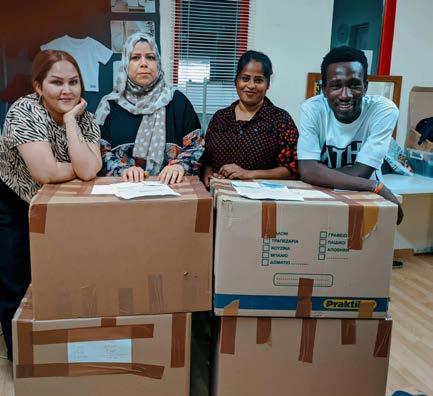
The core principle “Fair Jobs and Peace for All” indicates NAOMI’s position on the right of access to work under fair conditions, which is applied with its 4-6 employees in the workshop.
Through sponsored projects, the Production Department creates products according to the principles of sustainability and circular econo my (reduce-reuse-upcycling).
The first series of products, “Remember IDO MENI”, was created by using clean blankets
from the refugee camp at the border with N. Macedonia. Since then, many more products have been created by reusing and upcycling sail fabric, bicycle inner tubes, used cloth fabrics, as well as materials donated by various companies.
We Interviewed the head of the Textile depart ment of Naomi:
Can you tell me about your department please, what is the main purpose of that?
The first of all the goal of the Textile department of Naomi is to create workplaces for refugees.
We hire people, they are already professionals from their countries and we hire them in prop er conditions with a Greek law of course and try to prepare them for the Greek market. That means that they learn a lot of new things, for example, new techniques or new machines, that they don’t have in other countries and we make through this work integration, profes sional integration in the Greek market. This is the first goal that we have. That’s why we work together with the social department, they have an academy, that prepare also people, and if we need someone for work, if we are need someone for working place, so we ask first of all them, if they have somebody, that they think that he is professional enough to work for our Textile department.
Do you cooperate with other companies to know about vacancies?
No, we don’t need this, because all the time Greek companies call us and ask if we have people for working, because it is very difficult last years to find people, who knows sewing, they are young people, they want to work at textile companies in Greece, so we don’t have to look after, we need more people, so we can help them to find job.
How many beneficiaries do you have now?
Mostly we have between 3-6, it is depends on the orders we have, how many work we have, and of course from the place, because now we have very small place here in Naomi, so we tried to find some new bigger places and we can have more people, and also in case of the pandemy a lot of time we could not to have a lot of people, because of the place was very small.
We have two departments in Naomi, one is for learning how to sew from the first class until professionals. And the second department, that is our Textile department, we only hire peo ple to work for the Textile department. We pro duced three different kinds of things. One is our own collection, that means that we sell prod ucts with a lot of projects that we are working
on and our own collection. The other one is the one we make for people in need.
We also work as a “normal” company, we take orders from the customers and then we also produce for them.
We interviewed one of the beneficiaries of the Naomi as well:
How did you know about Naomi?
OK, I knew about Naomi from a friend.
What’s the role of Naomi in your life?
At the beginning i was not a professional sew ing person, I knew something about sewing, but not professional, so I started coming for lessons here, in Naomi and within sometime I be came a professional, and now I work for Naomi.
What do you do in Naomi.
Naomi employed me to work here and my role is to sew. When we have orders, I help to cut, to design, and work with materials. And for exam ple when we are making t-shirts, I have to cut and then sew.

How long did you learn sewing?
A year.
How long have you been working here?
I have been working for six months now. Is the salary enough for living? Are you satisfied with your job?
It is not enough, but we are managing, it is good for beginning.

 by Tatevik Harutyunyan
by Tatevik Harutyunyan
What could be a better way to bring people together than food? Food making and sharing is a social act and a means of exhibiting respect for an existing or future relationship of reciprocity. Food making is about hospitality and connectivity. There is no better way to bring people together.
That is why when people go to another coun try to live they bring their food practices also. In Greece you can get to know the cuisines of many different countries. One of those cui sines that you can get to know is the Armenian cuisine. Armenian history is very important in Thessaloniki. After the Balkan wars the lo cal Armenian community was the city’s third largest community after the Jews and Turks. That is why you can find many Armenian foods here. Erebuni Ethnic and Delicious restaurant can be one of the greatest places to try Ar menian foods in Thessaloniki. If hungry, come here for nicely cooked dumplings, lamb kebabs and pasta. In accordance with the reviewers’ opinions, walnut roll is tasty. It’s a must while visiting Erebuni Ethnic & Delicious to drink good Armenian wine which is one of the old est wines in the world. The legends of wine in Armenia go so deep that it’s sometimes said the first vineyard was started by Noah. ”After Yaweh’s “drown every living thing on the planet”
pilot scheme, Noah, it’s said, found land with his son’s Canaan, Shem, and the unfortunately named Ham just south of Armenia in modern day Mount Ararat. And, being that he had just spent 40 days and 40 nights shacked up with every animal on the planet (other than the fish, presumably), he built himself a little vineyard and got inebriated.
So, here you can try this oldest wine and deli cious beer. This also has some interesting his tory. Beer has been produced in Armenia since ancient times. In the 5th century BCE, after ar riving at a village in Ancient Armenia, Xenophon
wrote in the Anabasis that “There were stored wheat, barley, vegetables, and barley wine in the craters (clay pots). In the upper level of ves sels with the edges in the wine floated barley, and there was stuck a reed, large and small siz es and who wanted to drink, had to take a reed in his mouth and pull it through the wine. Not mixed with water, the wine was very strong, but for local people it was a very pleasant drink”. So you can try this beer brewed with ancient traditions too.
Since food is so important for the culture, peo ple take those traditions with them when they are moving to another country. Migration helps people to improve their lives and learn new cul tures, customs, and languages. Sometimes it is difficult to adaptate. They need to learn a new language, they must acquire new habits, and in general learn the rules of a new life. In this situation sometimes it seems that new people come only to improve their lives and have noth
ing to give to that new country. But they also have their habits, their social and cultural heri tage. They come with their own unique culture, customs, and language and come to change that society by painting it with their colors. The new country should only be able to accept the fact that the new members of the society are different. It can only be achieved by taking the culture of new people and giving your own. True integration helps countries overcome divisions that impede the flow of goods, services, capi tal, people and ideas. It can help not only new comers but also the host country to develop. And in this concept food is a key component to express our culture and identity. The choice of food shows a cultural expression and practice that is influenced by economics, society, cul ture history and individuality. Maintaining the home eating and cultural food habits represent a strategy to recreate the “home” and the prac tical and metaphorical rituals for remembrance the imaginary unity which migrants tend to miss.

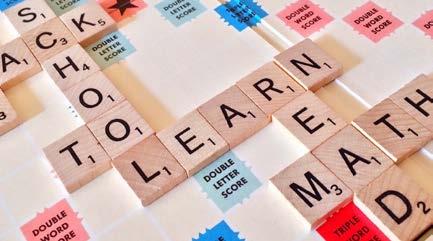
is supposed
great Equalizer, right? We are all told that if you work hard and do well in school, you can be whatever you want to be when you grow up. In this under standing of school, a meritocracy is created, or a system in which hard work and talent is recognised and rewarded. In a pure meritocracy, two children who work equally hard and have the same talents do equally well, regardless of the neighborhood they grew up in, no matter their race or gender or class standing. On the surface it might seem like school does a good job in compensating the existing inequalities in our society, but unfortunately data shows different. In fact having access to a decent education is a privilege not everyone has.
Let’s take a look at the data first. While the standard of education varies globally, educa tional inequality happens at the local level in all countries. For example, if you look at the higher education attendance rat e, you can see great differences among the continents. While only 4 out of every 100 kids in Africa are expected to enter graduate and postgraduate institutions, 14 out of 100 kids in South and West Asia do so and 36 out of 100 in Latin America. But even in developed countries inequality can differ greatly and a high GDP does not automati cally equals lower educational inequality. The Innocenti Report Card 2018, a report conduct ed by UNICEF, which focuses on educational
inequality in 41 of the world richest countries, has shown that for example countries like Ger many, the US and the UK, that have a very high GDP, are still ranked poorly in the League Table that shows the inequality (rank 23, 24 and 16).
So what causes these severe inequalities that affect the children`s future? To answer this question, we have to start even before the beginning of a children’s school career: their parental occupation. According to the afore mentioned report by UNICEF, large inequalities are linked to family background. Depending on the educational background of the parents as well as the social-economic status children get more or less supported. This support can for example look like reading stories to their children, investing in learning games or sim ply by showing interest so that the kid does not lose motivation for its classes. As stated in the report: “Differences in parental occupa tion explain up to one third of the variation in childrens reading scores at the ages of 10 and 15“. In addition to that, children with parents in
Education
to be the
How class standing, gender, race and neighborhood influences academic success
The great equalizer? Out Of The Borders E DUCATION AND E NVIRONMENT
high-status jobs are much more likely to pur sue higher education than those with parents in low-status jobs. So already at the moment when the children enter primary school, they all start with different conditions. From there on many factors out of the children’s control will determine their way.
One of them is the school itself. Especial ly in countries like Hungary and Luxembourg children from richer and poorer families go to different schools and thereby get different qualities of education. But not only the school plays a role, unfortunately all kinds of discrim ination that exist in society do not stop at the doors of institutions like school. Classism for example plays a major role in education. The Innocenti Report has shown that children aged 3 and lower are less likely to attend preschool if they live in the lowest-income households. In addition to that, even though primary and secondary school is free in most of the exam ined countries, materials like books or tablet computers are still expensive and especially in times of economic hardship like right now, the costs of education are easily underestimated. If you made it through high school as a working
class student and got your diploma, one might think now everything becomes easier. But the contrary is the case. Colleges and universities have become a manifestation of classism. Just imagine working between 40 and 50 hours a week, attending full-time college and balancing a social life. Then, imagine coming home to a roommate that has their college paid for and gets lots of extra time to study.
Besides classism, schools also have a major problem with racism. Since racism is some thing deeply integrated in our society and the individual minds, teachers may mistake Black preschooler´s chattiness for hyperactivity or bad behavior, instead of recognising the child’s storytelling abilities. Compared to their white classmates, black students are disproportion ately viewed as troublemakers and are two times more likely to be suspended. In addition to that they have to deal with all kinds of mi croaggressions on a daily basis and are ap proached with a lot of stereotypes. Of course having to face these injustices everyday is not without consequences. Black students may re act with exhaustion and self-censorship.
Now imagine being affected by both, classism and racism. The novel “Girl, Woman, Other”, writ ten by Bernardine Evaristo, depicts this issue of intersectionality very well with the character of Carole. Alongside the other eleven characters, who are all black women living in the UK and dealing with how race, sexuality, gender, history and economic stratification intersect and define their experience, Carole is a young financial ex ecutive trying to succeed in a male-dominated workspace. When she gets into the prestigious

Oxford University she feels like a misfit due to her race and working-class background. She is one of only very few black students on the campus and through her eyes the readers can sincerely relate to her experiences on a human istic level rather than discussing these topics in an abstract way. Even things like being asked for drugs because of her skin color or listening to her classmates talking about the activities they have done during holiday and all the plac es they have visited can make one feel exclud ed and like not belonging there. The feeling of not belonging goes so far that she even wants to drop out of college. With the encouragement of her mum, she manages to continue and she becomes friends with some wealthy students who expose her to a new side of life. Later on she marries a wealthy white British man who admits to her that he mastered his way through college and his career mainly because of his parents` connections, which shows once again how deeply inequality is integrated into educa tional systems and how unfair the conditions of people from different backgrounds are.
So as shown by the data and the personal ex perience of Carole, education is not the prom ised equalizer. It is a great tool if used properly but unfortunately the existing forms of oppres sion and discrimination in our society are also part of the institution that should erase them. Of course there are some wonderful and hope ful success stories of people using education and knowledge to get out of their situations but the overall experience of disadvantaged peo ple is still shaped by discrimination in school. These barriers often inhibit people from getting a good paid job and decrease their chances of living a decent life.
Sources: https://www.unicef-irc.org/unfairstart
https://cete.osu.edu/initiatives/racial-equity-diversity-and-in clusion-redi-initiative/race-in-education/


https://youtu.be/T-JVpKku5SI
Novel “Girl, Woman, Other” written by Bernardine Evaristo. Pub lished in 2019 by Hamish Hamilton
The climate crisis has been in our minds for quite a long time. There is endless news about temperature records, droughts, floods, hurricanes, fires, and so on all over the world. This is nothing new. This year, climate change drove Europe into severe heatwaves and droughts never seen before. And as extreme weather events don’t exist in a vacuum, they also lead to major effects on people, especially on those in an already susceptible situation.
CARE International has reported that these events are disproportionately affecting wom en. Disparities in information, mobility, de cision-making and access to resources and training limit their ability to access relief and assistance, threatening their well-being. And since women and girls face various forms of sex ual and gender-based violence (SGBV), changes in the environment push them into a vulnerable position by exacerbating existing inequalities.
For example, research published by aid organ isation Plan International reports shows that, in Ethiopia, drought and desertification are in creasing women’s risk of sexual assault. As water sources and wells are drying up, women need to walk long distances for fetching water or fire wood, leading to more rapes and abductions.
In Bangladesh, young girls are being forced to marry in the aftermath of extreme floods, be cause “it means one less mouth to feed”. In ex
change for cattle, girls in Malawi and South Su dan are also being sold off in marriage during extreme droughts. Child marriage becomes then a survival strategy, relieving pressure on the family or as the only way to generate in come. The situation is similar when it comes to forced prostitution - it is happening as it seems to exist no other choice.
In western Kenya, as fish have become scarcer, fishermen are now not only expecting money as payment, but they’re also demanding sex. This practice is now so common that, accord ing to an International Union for Conservation of Nature study, it became known as the Ja boya system.
And it doesn’t end here - there is an increased risk of domestic violence in places where wom en are responsible for agriculture. If a sudden natural disaster threatens the harvests, the stress arising from the loss of income can have
dramatic effects, ultimately leading to violence, often perpetuated by their own relatives.
Traditional gender roles are also influencing SGBV during extreme weather events. Name ly, women are more likely to die as a result of flooding because they rarely seek refuge in emergency shelters. In Bangladesh, they might prefer to barricade themselves in their huts, where they often end up washed away by the floods, than being in very cramped shelters, since it’s not appropriate to stand there face-toface with men or to use the same toilet. More over, it often falls to women to take care of old people and children, tying them home where they can be more vulnerable to hurricanes or floods. Even after natural disasters have end ed, if emergency accommodation doesn’t of fer protected rooms, women and girls can be vulnerable to violence by men when they use shower or toilet facilities.
To end this row of examples, activism must be addressed. In Mexico and Central America,
between 2016 and 2019, around 1698 acts of violence were recorded against women human rights defenders. Threats and sexual violence, such as rape, are often used to target environ mental activists to weaken their status within the community, and to prevent other women from working to preserve the environment from the construction of a new mine or dam, for example.

“
When women stand up to challenge environ mental destruction, pollution and disposses sion, they are stepping out of their traditional roles to challenge unjust power that is in the hands of political, economic, social and cultur al institutions; and society retaliates with vio lence against the women.”, Michelle Bachelet, UN High Commissioner for Human Rights
But SGBV resulting from extreme weather events isn’t uniform at a global level. Climate change is a threat multiplier, meaning it esca lates social, political and economic tensions. Furthermore, the risks are acute for racialized women and girls, older women, the LGBTQ+
community, women and girls with disabilities, migrant women, and those living in rural, re mote, conflict and disaster-prone areas.
As an example, in 2016, people in Fiji thought that Cyclone Winston was a sign of divine rage against LGBTQ+ people. In the sequence of Hurricane Katrina, there was a backlash against gay communities because others blamed them for the disaster. In other cases, transgender people have been threatened in relief shelters or barred from access to them.
“ Sexual and gender minorities face specif ic and increased risks of gender-based vio
lence, which are important to consider in gen der-based-violence policies, interventions and services,” Kim van Daalen, researcher.
All of these examples make the idea of privilege very clear. Climate change is not gender-neu tral. And it is unjust - the ones contributing the least to it, are also the ones being more impact ed by its consequences. As it fosters SGBV, the need to address this issue becomes evident, concerning each place and culture.
Apart from local movements that have been playing their role, some other wider movements are combining the two issues - climate change and SGBV. In particular, it is possible to point out ecofeminism that has sought to explain the crucial linkage between environmental de struction and violence against women.
Nonetheless, at a governmental and inter governmental level, there is much to be done. On the one hand, the ultimate goal seems to be the end of structural gender inequalities as a whole, tackling the violence perpetrated against women and girls. On the other hand, recognizing increased SGBV as a particular consequence of the climate crisis as part of the agenda is essential - institutions must be ready and capable to cope with it and make a change, supporting and incorporating women and girls in climate policy and decision-making. Climate action without inclusivity will fail to en dure the climate crisis today and will generate more challenging issues in the future.

 by Elisabedi Katcharava
by Elisabedi Katcharava
In the morning of the 24th of February, after Putin’s announcement of “special military op eration” to “demilitarize and denazify’’ Ukraine, the Russian invasion of Ukraine started. War devastated every single citizen of Ukraine and shocked the whole of Europe. Women espe cially have been victims of unbelievable cruel ty from Russian soldiers: the cases of sexual assault and rape increased in the past few months, as women during war time are one of the most marginalized group and rape is often used as a weapon.
Around 8 million Ukrainians fled the country since February; among those, 90 percent of refugees are women and children. One of the major destinations for shelter has been Poland: despite its harsh policy during the refugee cri sis, Poland had warmly welcomed Ukrainian refugees and was widely praised for it from the world. When it seemed like they finally found a safe place to settle and get help, many of the Ukrainian women faced a harsh reality. In
Ukraine, abortions are legally provided on re quest in the first 12 weeks of pregnancy, oral contraception is sold over the counter without prescription and the morning-after pill is read ily available. By crossing the Polish-Ukrainian border, Ukrainian women who became preg nant due to rape from Russian soldiers faced the strictest law in Europe regarding access to contraception and abortion.
In October 2020, the Constitutional Tribunal of Poland limited an already strict law on abor tion, which left women with only right to aborte in case of rape, incest or if the mother’s health is under severe threat. Since then an anti-gov ernment demonstration, ”Women Strike’’ took place, however there still is no change in 2022.
Ukrainian women who seek for abortion be cause their significant other is on a front line in a war, or just they do not want to give birth in a time of war when everything is uncertain, need a support which is difficult to find in a foreign country, especially during war. As abortion is officially denied to women, the only solution in
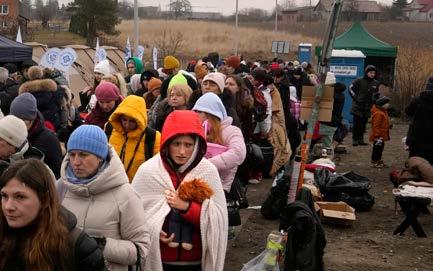
some cases is to find a doctor who could prac tice it in secret, facing the risk of getting to jail.
On paper, women who had been sexually as saulted during a war can have legal right to abortion but in practice, activists and providers say that abortions for rape victims are almost never performed. It needs to be approved by a prosecutor and victims have to explain exact ly when, where and how it happened, which is very hard for a victim who came through a long way to talk about it. Trauma, fear and stigma can deter people from coming forward.


Krystyna Kacpura - president of Feda- a wom en’s rights group, said - “They want to keep it top secret… They don’t want to share it with their families. They said to me, ‘The war will end one day and we have to continue our nor mal lives.”
Polish gynecologist Dr.Agnieszka Kurczuk in an interview with VICE recalled an episode: “One day Katya came to the clinic, 21 years old from Kharkov. She said that she was raped by many Russian soldiers. She was in total PTSD and she couldn’t say when it was, where it was other than just ”few days ago”.
The exact number of cases of sexual violence during the war against Ukranian womenis not certain. Hundreds of girls like Katya are out there today. They are scared of the past, pres ent and future and the Polish government con tinues to ignore the issue depriving every single woman of the right to their own body. One thing is certainly clear: war continues in Ukraine, and so it does in Poland against women.
an imperative subject to review their path in this journey.
According to the data of international organi zations, one out of every eight immigrants is a child. Migrant children therefore represent a significant percentage of all refugees and mi grants worldwide.
A significant proportion of the migrant community is made up of children
The 161,000 children who applied for asylum in the European Union in 2017 accounted for onethird of the total asylum applications made that year. Approximately 25,600 of these children are unaccompanied during migration. Millions of migrant children are migrating to safe areas for education and employment opportunities
in search of a better life. However, millions of children are forced to leave their homes due to violence, war, persecution and exclusion. Immi grant children often have limited options for us ing safe roads and moving with their families. Children are exposed to many challenges, such as violence, abuse, exploitation or discrimina tion, on transit routes and destinations.
“
We came on foot from the mountains for about 16 hours without food and water. We saw a lot on the way. There were some peo ple who were leaving their newborn babies on the road in order to continue. A family left their 1-year-old baby on the road and I brought him to Turkey.”
It is necessary to examine migrant children not only during these journeys, but also at their destination. It is often for them to not have the opportunity to have education and appropriate
A child on the migration route with his teddy bear
© https://www.maghrebvoices.com/

Forced migration is a traumatic process and it’s causing material and mentally losses for all the groups in the society. For the more vulnerable groups of the society like women, old people and children, forced migration leads to heavier consequences. Considering the lower level of Consciousness and increased vulnerability due to their ages, the impacts of forced migration on children are more clear. Children suffer from wars and conflicts that they do not know, understand or cause, however they are the ones who have the effects of forced migration more than any other group of the society. Therefore, it is
‘
medical care wherever they go. Being foreign ers of the destination country, especially trying to learn a new language and integrate into a new culture, makes it difficult for them. The dif ferences in speech and language of education show the difficulties that children experience in their education and social life. Since children have problems with communication in their social environment, they experience difficul ties in expressing themselves and behavioral problems due to not being able to establish healthy relationships. One of the fundamental rights of children is education. Of course, these difficulties also have permanent physical and psychological effects. After these migrations, anxiety disorder, post-traumatic stress disorder, post-traumatic stress disorder, antisocial person ality disorder can be seen widely among children.
‘
’I came here with my family and my sister. Before I came here, I was preparing to go to high school, but we had to leave the country. When we first came here, our situation was not so bad, but as time passed, being in another country caused us hard times. Instead of going to high school, I started working in a wedding dress shop. I had to put my dream of traveling the world aside…’’ Life story of S. who left her country.
’I was just a kid when I came here. It’s been hard being away from all my friends. The hard est part was not being able to go out of the house here. It was very difficult to have to live in a country where I did not speak the language. In the first years, I could only spend time with a few friends who had come from my home country. After learning the language in a few years, I was able to communicate with the lo cals here. I am now 18 years old, but I feel really tired. It’s like my struggle here has exhausted me already.’’
R. who left his country at a young age and is now an adult in his adopted country.
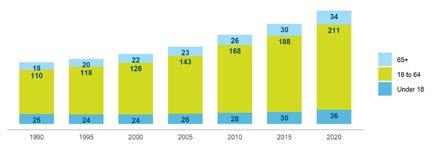
Forced displacement due to conflict and de struction, the traumatic process of forced mi gration, disruption of economic livelihoods and solidarity networks, disintegration in social relations, isolation, stigmatization and exclu sion, as well as children’s disengagement from school and decline in school achievement, which will affect their future due to the men tal traumas they experience, are just some of the effects of forced migration on children. The fact that these families are almost left on their own with housing, health, education, poverty, unemployment and psychological problems, which are especially effective in making them feel lonely, excluded and like refugees in their homes. The violations of rights and traumas that children experience due to both the con flicts they witness and the displacement they experience has been rendered invisible on the world’s agenda. Graphic of migration due to age
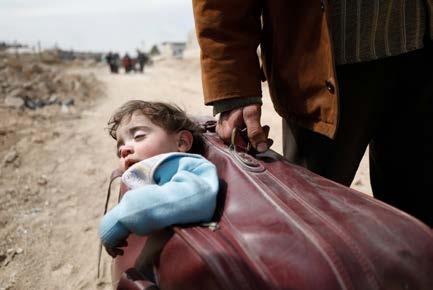
The basis of the problems that migrant children may encounter lies in the economic, social and psychological problems that the family fac es in the new environment they migrate to. In this process, it is necessary to improve the so cio-economic levels of the families of migrant children, to carry out activities to strengthen their social cohesion and raise the awareness of local people on migration, to ensure that


© https://www.nytimes.com/
children go to school, to place orphans in or phanages, to include rehabilitation programs in the transition process from street to home, and to support and protect children mentally. In this context, public and non-governmental or ganizations have the responsibility to identify and guide migrant individuals in terms of their access to basic life rights such as identity, shel ter, health and education…
© https://www.humanium.org/ © https://andina.pe/
 Children in a refugee camp
An image of migrating children on a truck
A refugee child’s daily work
Children in a refugee camp
An image of migrating children on a truck
A refugee child’s daily work
Forced migration is a traumatic process and it’s causing material and mentally losses for all the groups in the society. For the more vulnerable groups of the society like women, old people and children, forced migration leads to heavier consequences. Considering the lower level of Consciousness and increased vulnerability due to their ages, the impacts of forced migration on children are more clear. Children suffer from wars and conflicts that they do not know, understand or cause, however they are the ones who have the effects of forced migration more than any other group of the society. Therefore, it is an imperative subject to review their path in this journey.
Cryptocurrencies, blockchain, or NFTs, for the great majority of us, these terms are no longer strange. Over the past years, we have attend ed to a humongous rise of the c rypto world and its technologies. The pandemic times and its promotion as an essential part of the metaverse have set up the crypto world as a field of opportunities that promises to change our relationship with money and technology.
Digital currencies have arisen in the trading world as a critical investment, an innovative way to buy art and the most reliable replace ment for traditional banking. However, they were not conceived for all these purposes. So, how did the cryptocurrencies change from being the mavericks’ alternative economic pathway to being the new playground for the better-off?
It was 2008 when the first blockchain digital currency sprung. Yet, cryptocurrencies had ex isted long before; admittedly, we can establish eCash, a coin born in 1990, as the first digital coin. However, Satoshi Nakamoto’s —whose identity remains a secret to this day— new ‘peer-to-peer’ electronic cash system caught the public’s attention with blockchain and Bit coin, today’s highest value cryptocurrency.
As stated in its presentation paper, Bitcoin appeared to offer ‘an alternative financial sys tem’, allowing its users to evade the traditional centralized financial infrastructures and offering
Physical Bitcoins. Every coin has a private key printed on its back, holding the currency’s actual value in a digital wallet.

When the Alternative Route Becomes the Playground of the Rich
“Cryptocurrency is such a powerful concept that it can almost overturn governments.”
Charles Lee (Litecoin creator)
a solution to problems such as bans, server shut downs, privacy concerns or the block of payments.
“Commerce on the Internet has come to rely almost exclusively on financial institutions serving as trusted third parties to process electronic payments. While the system works well enough for most transactions, it still suffers from the inherent weaknesses of the trust based model.” Nakamoto, 2008, p.1
‘ Commerce on the Internet has come to rely almost exclusively on financial institutions serving as trusted third parties to process electronic payments. While the system works well enough for most transactions, it still suf fers from the inherent weaknesses of the trust based model.’ (Nakamoto, 2008, p.1)
In short, this new technology introduced a co lossal benefit: it made it possible to take any third party out of the electronic transactions equation without compromising privacy or se curity. Hence, no one could ever stop a transac tion again, as the whole process would entirely rely on the two active participants of a purchase.

Customarily, when we buy something (be it on the Internet or in the physical world), we make a transaction through our banks. These acqui sitions involve a series of fast communications essential to complete the shopping process. As a result, the banks become an indispens able part of the transactions, registering all movements and allowing the completion of the purchases. Consequently, they charge a fee for this service.
The ‘traditional’ system entails concentrat ing private data in a single centre. The banks
 2Visual representation of blockchain.
Bitcoin and Ethereum physical coins (Ethereum’s coin is just a collectable item without monetary value).
2Visual representation of blockchain.
Bitcoin and Ethereum physical coins (Ethereum’s coin is just a collectable item without monetary value).
manage all our financial information unilateral ly. This data management permits purchases since our banks can go back to the registers, check that we have the necessary amount of money to acquire a product and record the changes in the same database. Yet, it involves various problems: foremost, not a single bank can guarantee the security of that information, nor the absence of cheats. Besides, this sys tem places all the power in a single institution.
The cryptocurrencies stepped in to change the rules of the game. Bitcoin, like any other block chain-based currency, withdraws control from the banks by creating a secure and indepen dent database system. Therefore, cryptocur rencies come across as disruptive technology with the power to induce financial, political, and even social change.
Blockchain is at the core of this revolution. De spite its pompous name, it is not radically dif ferent from the traditional databases our banks work with. However, they are not merely a sin gle base of information. In fact, what makes it such a reliable system is that it consists of a set of copies distributed in several spaces.
And, what is more enthralling, the information cannot be modified. Every time we perform a transaction, we create a new block containing information. As a result, each transaction is stored in an independent block, connected to the previous ones and ordered in a chronolog ical fashion. As you can imagine, that is where the term ‘blockchain’ comes from.
Blockchain’s redundancy (the copies of the databases) and impossibility to be overwritten make the system incredibly secure despite fall ing outside of the traditional methods, result ing, once and for all, in the actual incorporation of digital currencies in the markets.
Behind the hype of blockchain, there is not only a technological transformation but also an ideology of social change; this system pro vides a revolutionary way for people to interact in respect of things of value, putting them at the centre of the decision-making plexus.
With blockchain and cryptocurrencies, people no longer need to put their trust in a third-party element. The system is deconstructed by over throwing the traditional centre constituted by governments and financial institutions (whose interests might not be those of the individu als using their currencies and services). Now, money, art and important documents such as land titles or medical records are managed by the net of users.
Such a quality immediately created a group of ‘enthusiasts’ who saw the potential in this Physical Dogecoin coin (collectable item).

form of money —and its technology— to boost financial and, most importantly, social change. These people believe the general implementa tion of blockchain-based currencies would lead to the elimination of corrupt systems. Hence, cryptocurrencies turned into a subversive ele ment providing the tools to create democrati cally controlled systems working for the peo ple’s best interests.
Outstandingly, this system does not solely rely on people’s trust in change for the better. Cryptocurrencies are valuable per se despite not being backed or issued by any government like euros o dollars. Alternatively, they leverage their power in the open source community, its transparency, easy maintenance and its disin flationary nature.
While most money’s value depends on their respective issuer governments’ policies, cryp tocurrencies ground their value on their limited nature. For instance, there will ever be 21 mil lion Bitcoin; the very last Bitcoin will be mined in 2140, and, after that, not a single extra unit will be put in circulation.
Besides, cryptocurrencies come with extraor dinary usability. One of the advantages they of fer over traditional money is easy and pain-free
international payments, without fees or long clearing times. And undoubtedly, this indepen dent operativity of blockchain infrastructures is paramount for those encouraging the change.
Yet, controversy has always surrounded this new trading asset regardless of the potential benefits the extended use of cryptocurrencies could bring to society.
For many, its disconnection from regulato ry entities offers opportunities to perpetuate questionable activities. Indeed, since its very origin, Bitcoin was linked with the infamous website SilkRoad, a place on the darknet where all sorts of illegal products could be bought.
For others, the bad reputation of cryptocur rencies comes from the greediness of some creators and investors. The crypto world is crammed with thousands of worthless coins without any cutting-edge underlying technolo gy. Hence, most of them are built upon nothing and tend to fail.
Over the past years, several scandals popped up linking certain coins to scams, pyramid schemes, and fund hacks. As a result, a big part of the population perceives cryptocurren cies as a fad, a simple speculation trend that will eventually fade away, leaving people with out their money.
One of the most recent and notorious cases feeding the scepticism on cryptocurrencies is that of Elon Musk and Dogecoin. A case that Crypto’s aggressive bid for more DC firepower. (bitcoin-on-capitol-hill.png)
© Protocol. (2022).

clearly depicts the speculative bubble around digital money.
Dogecoin is one of those currencies lacking any value. In fact, it came out as a meme, a response to a high speculation period. It is a virtual joke to amuse those making part of the blockchain world. And incipient purchasers of this coin acquired it knowing it had no value nor utility. They invested just for fun.

Surprisingly, the coin was strongly supported and promoted by the entrepreneur Elon Musk, who declared to own the coin himself and even his companies (Tesla, SpaceX, and Boring Co.)
accepted the digital currency as payment for some time.
By doing so, Musk profited billions of dollars at the expense of other Dogecoin investors, which ended up with him being sued for $258 billion over a pyramid scheme. Musk knew all the way the currency lacked intrinsic value and that his influence would lead this particular coin market.
“Musk used his pedestal as World’s Richest man to operate and manipulate the Dogecoin Pyramid Scheme for profit, exposure and amusement.”- Keith Johnson.
While personal influence is one of the most effective ways to manipulate the cryptocurren cy market and thwart change, it is not the only street the privileged can take to benefit and preserve their position.
Revolving doors have set in, making it clear that there is a rising conflict of interest in this field. This situation is undeniable in the Unit ed States, where the industry growth has re inforced the need to address crypto’s biggest challenge: legal and regulatory matters.
Navigating the convoluted sea of regulations is not only complicated but also remarkably ex pensive. Thereupon, it is no wonder that these digital businesses have turned to top regula tors. And, being such a lucrative enterprise, it has attracted ex-members of the Securities and Right now cryptocurrency is a form of elite defection
Exchange Commission, The Federal Deposit In surance Corporation, the Treasury, and Congress.
According to the Tech Transparency Project, nearly 240 officials with key positions in the American regulatory institutions are now work ing in companies such as Coinbase Global Inc, Binance Holdings Ltd., and Ripple Labs Inc. The cryptocurrency industry is committed to the White House lobbying machine, creating a crack that undermines the foundational ethics of blockchain-based digital money.
Serving the interests of the fat cats Ostensibly, the populist and democratic foun dations of cryptocurrencies are shaking. Digital money gained, indeed, significant popularity, yet it never caught on as an alternative to tra ditional finance. Even so, it worked to make the rich get richer.
The beautiful dream of Bitcoin appealed to thousands with its promises of equality and its apparent possibility of creating something from nothing. An idea that the media has sustained with stories of successful investors that went from being ordinary people to millionaires.
Still, that idealistic approach to digital money was never veracious. Everyone can invest in cryptocurrencies, yet those with the ability to risk losing big money have the biggest advan tage. Investing in cryptocurrencies can resem ble gambling; those putting more money can play more games with better odds.
Right now cryptocurrency is a form of elite de fection - Vinay Gupta, Ethereum co-funder
Bitcoin, Ethereum or Ripple are just a method for the better-off to continue to get richer. The achievement of making money from this type of investment hides a privilege; usually, those who could afford to lose thousands became obscenely affluent, proving that economic in equality creates more disparity. Note that 1000 people own 40 percent of the Bitcoin market, according to Aaron Brown (former managing director and head of financial market research at AQR Capital Management).
Blockchain came into this world with an an ti-statist democratic spirit. But, ironically, it rap idly evolved to favour the elite in a new specu lation game. It is the same old song played with a faster speed, that of the Internet. And while it has gifted the world with more immediate, se cure and reliable transaction technologies, it has dramatically failed its original purpose by only helping the rich get richer in a new playground.
Sources: Nakamoto, S. (2008). Bitcoin: A Peer-to-Peer Electronic Cash System. https://bitcoin.org/bitcoin.pdf
Adentuji, J. (2022). Behind the crypto hype is an ideology of so cial change.
https://theconversation.com/behind-the-crypto-hype-is-an-ide ology-of-social-change-177981
Revolving Door Project. (2021). Tracking Crypto’s Revolving Door. https://therevolvingdoorproject.org/tracking-cryptos-revolving-door/ Khemani, K. (2022). The rich get richer: Rethinking Bitcoin’s power as an inflation hedge.
https://techcrunch.com/2022/01/09/the-rich-get-richer-rethink ing-bitcoins-power-as-an-inflation-hedge/
Freedom of the press, which is based on the Declaration of Human Rights, is an indispens able part of the freedom of information for peo ple.The most important feature of the press is that it must present news and information to the public in an accurate and impartial man ner. A journalist who receives the news by us ing the freedom of the press and informs the public should also make news by taking into account social benefits. Where there is no free dom of the press, other freedoms cannot be mentioned. The first regulation on this issue is found in the American Constitution.Thomas Jefferson, the former President of the United States of America, who was also a jurist, said: “I prefer a press without a government to a gov ernment without a press.”
“ Everyone has the right to freedom of opinion and expression; this freedom includes the right not to be harassed for his opinions and to seek, receive and impart information and ideas by any means and regardless of frontiers.”

It is observed that pressures on the press in crease from time to time all over the world. The
pressures faced by journalists in conveying information accurately means that the most fundamental right to convey and receive news is violated. It can be explained with examples from history that freedom of the press in par ticular has been subjected to the impositions of regimes such as fascism in the past, and in the early 20th century, these were tried to be suppressed in different ways, with some restrictions and coercion. In fascist Nazi Ger many, the press was seen as a tool serving the government. It is possible to give examples from the history of the press facing certain re strictions by states. In Mussolini’s Italy or Hit ler’s Germany, the Press Chambers, of which journalists were obliged to be members in or der to put pressure on journalists, completely abolished freedom of the press.
Censorship is one of the most important practices that adversely affect freedom of the press. Censorship is a practice that prevents the free transmission of news and attempts to regulate and manipulate it. Apart from cen sorship, other factors affecting the freedom to receive and transmit news are the lack of union security, the inability of newspaper employees to freely express their opinions, the lack of per

A precious privilege that no one can give up
© https://www.euractiv.com/ Out Of The Borders
sonal security, the monopolization of the press and commercial relations with the state.
One of the biggest problems limiting press freedom today is the monopolization of the media. According to available statistics, me dia freedom has been deteriorating worldwide in recent years. Pressures on the media are increasing both in developed societies and in authoritarian states. Another concept that exists to protect and sustain freedom of the press is press ethics. It is important that no one imposes the rules to be followed by a free press on the press.The intervention of forces outside the press, the most important of which are political powers. External interference by forces outside the press will lead to the emer gence of wrong practices.The press should determine its own code of ethics and apply it independently. States should not interfere with the freedom of the press and should support the press to ensure its own control in line with its own principles.

alist order presents the events to the peoples of the world by distorting the facts in line with their own interests.
Freedom of the press includes the right of the people to receive news, to be informed and to learn the truth. If the people cannot receive news, learn about events accurately or if the revelation of events is prevented by the govern ment, then there is no freedom of the press in that country.

The individual’s right to express his/her thoughts, censorship, self-censorship, inequal ity in justice and violations of rights should not be forgotten. It is not possible to talk not only about freedom of the press but also about fundamental rights and freedoms in countries where there are still about 500 journalists in prisons and the number of unemployed jour nalists is growing like an avalanche. Turkey, China and Egypt account for more than half of all journalists imprisoned in the world.
The intensity of repression varies from coun try to country, but the aim is always the same: To prevent the press from fulfilling its role as a check on power. If the facts cannot be reported or the basic concept of truth is watered down, political leaders can do as they please without being responsible for the consequences. Even in the world’s most effective democracies, large segments of the population no longer re ceive unbiased news and information. This is due to the authoritarian environments created, such as the imprisonment of journalists and restrictions on media independence. Among these methods, government-sponsored privat ized media are an obstacle to honest journal ists. The aim is to ensure that the press serves those in power, not the people.
Rapidly advancing information and commu nication technologies have had a profound impact on democracy worldwide. The media, which had been subjected to censorship and surveillance by the world’s authoritarian re gimes, began to use new platforms for the free dissemination of news. In recent years, they have extended their influence beyond their bor ders to silence critics, overthrow democratic governments and reshape international norms and institutions to serve their interests.
The ability of journalists to report freely on matters of public interest is a very important indicator of democracy. A free press can in form citizens about the successes or failures of their leaders, communicate the needs and aspirations of the people to government bodies and provide a platform for the open exchange of information and ideas. When media freedom is restricted, these vital functions are impaired.
“Freedom of the press is a precious privilege that no country can forego.”- Mahatma Gandhi
 by Eleni Kapnopoulou
by Eleni Kapnopoulou
Pretty privilege operates on the principle that people who are more conventionally attractive based on societal beauty standards have more advantages and opportunities compared to people who are deemed less attractive.
I have created a gallery of photos showing real bodies as a way to start accepting “imperfec tions”, to accept ourselves. We all deserve to feel amazing in our skin.

Source:https://dailyfreepress.com/2022/03/02/pretty-privi lege-is-real/








Johan Galtung defines “the cause of difference between the actual and the potential, between what could have been and what is” as structur al violence. This is a concept that has much to do with privilege. The structure of the society encourages the privileges of some and limits that of others. Many of us have privileges but may also struggle in other parts of our lives due to reasons that are not conductible to us but which are actually rooted in society, stereo types and culture.
The struggle of privilege may not always leave visible marks or scars but it still hits and hurts. Moreover, privilege- or better underprivilegedis intersectional. This is something grassroots movements advocating for social rights have been addressing for a long time now. For ex ample a trans women is subjected to gender discrimination twice, for being women and for being trans. Therefore, today we talk about transfeminism rather than only feminism to include and give voice to a wider intersectional struggle.
Academics talk about “the pyramid of privi lege” where, in an abstract ideal-typical sense, the top of the pyramid would be the white cis
gender heterosexual able and, economically, physically and mentally healthy man. The more an individual gets away from this typology of subject which incorporates privilege, the more the structure will hinder one’s potential. It is dif ferent to be a white person rather than a PoC1, and again to be a PoC woman, or again to be a transexual PoC woman, or again to be a dis abled transexual PoC woman and so on... you understand the logic. Everyone of us may be more privileged than someone else and not be aware of it. It takes time, education and decon struction but by listening to the needs of each other we can really contribute to solidarity and increased life quality for whoever is struggling with issues related to privilege.
So take the quiz and check your privilege!
1. Have you ever been afraid to walk hand in hand with your partner?
a. No
b. Sometimes
c. Yes, most often
(people belonging to the LGBTQIA community are often afraid of walking hand in hand with the person they have a relationship with as they may be insulted and sometimes even subject ed to physical violence due to homotranspho bic reasons)
2. Are you afraid to walk alone at night?
a. No b. Sometimes c. Yes, most often (Most women, gay people or queer people are afraid to walk alone at night especially in streets without lights as they fear being sub jected to violence. Sometimes violence can be delivered even in relation to racism. Check your friends, offer to walk them home or stay on the phone with them)
3. Have you ever changed the way you were dressed out of fear of being catcalled or being insulted?
a. No b. Sometimes
c. Yes, most often (Women and people from the LGBTQIA+ com munity are called out due to their dresses. Sometimes people feel they have the right to sexist comments based on how a woman is
dressed. Person of Color is a term used primar ily to address every person who is not “white” without 1 incurring in offensive language, es pecially if you are white).
Your body is always your choice and the way you dress it as well. Privileged ally try not to stay silent when these episodes happen).
4. Do you know what a dead name is? a. No b. Yes, but not because I have one c. Yes, people have called me that
(The dead name is the former name of a trans gender person. The person does not recognize this name anymore as it is connected to a gen der they don’t identify in. To be called by a dead name denigrates the gender of a person and the way they identify with it).
5. Have you ever been addressed with a slur (n word, f word, s word)
a. I don’t know what this is b. No c. Yes
(A slur is to take a word and charge it with neg ative connotation related to ethnicity, gender, sexual orientation, health or disability. Fun fact: a slur addressed to the white cisgender hetero sexual able man does not exist... privilege?).
6. Has your mental health ever been a limit for you either economically or socially speaking?
a. No b. Sometimes c. Yes, often (Mental health issues are still treated as a ta boo. We have a mental health just as we have a physical health. You would never judge some one struggling with a physical disease, why should you do it with someone struggling with a mental one? Moreover treatments related to mental health is still unaffordable for many people. Maybe we would like to see a psychol ogist but you cannot afford one).
7. Have you ever struggled finding your size of clothes in shops, especially fast fashion?
a. No b. Sometimes c. Yes, often (Sometimes the way you look is also consid ered a privilege, but even beauty is socially con structed. Fat phobia is still an underrated issue in our society. Sometimes people struggle to find clothes because the society promotes a certain type of body as the norm, but a body is a body it’s not a norm. Moreover, keep an eye
on your friends and educate yourselves on eat ing disorders).
8. Have you ever been denied a house or a job due to your ethnicity?
a. No b. Sometimes c. Yes, often (People with ethnicity different than white may be denied houses or jobs or sometimes. This happens due to racial hatred or racial prejudice which we still have not overcome).
9. Can you afford to have a sustainable and healthy lifestyle (for example buy healthy organic food, afford the gym, afford ethical clothing) but even to go on vacation, or afford the doctor?
a. Yes b. Sometimes c. No
(Economic privilege is also a thing. This privi lege leads to a whole vicious circle related to many areas of our lives. The paradox is that to have a lifestyle that would be sustainable and would support equity is often expensive and not affordable).
10. Have you ever felt lonely or rejected from your friends and family due to reasons related to your gender, sexuality or mental health?
a. No b. I have never talked to them, I am scared of the reaction
c. Yes (Struggles are not only related to our place in the “outside world” but they may have an im pact on the intimacy of our family and circle of friends. People may be scared of judgment to come out as homosexual or transexual or even to share mental health struggles).
11. Have you ever been called inspiring for doing something completely normal such as eat a salad?
a. No b. Sometimes
c. Yes, often (Abilism is another form of discrimination. It relates to having a stereotyped idea that peo ple with Some kinds of disability cannot lead a normal life or cannot even do something very normal. People with disabilities are not super heroes, they do not need to inspire just because they have a disability. People with disabilities are people first and foremost. Let’s start to talk about disability in a different and more inclu sive way).
If you mostly answered A: you may be pretty privileged although each and every one of us has its own struggle. What can you do? Become an Ally! An ally is not part of the discrimination but supports the struggle. You can be an ally to the LGBTQI+ community, a feminist ally and so on. But be careful this is not your struggle, do not make it yours! Instead, use your privilege to become a megaphone and share the strug gle or denounce when you see it. For instance: is someone is catcalling a girl walking in the street or using slurs? you may address to them and don’t be silent.
If you answered mostly B: you may be strug gling with privilege, or you are an ally or you simply know what it means to struggle. Decon struction never ends, we always have to learn and no one is exempt from its own privilege 100%. Privilege can become a strength if used in the right way and we may always broaden our horizon by discovering and listening to oth er struggles.
If you answered mostly C: you probably know well what it means to struggle with the struc ture and probably know well what intersection ality is! You are not alone, you are seen and heard.
Check for associations in the city where you can find a safe place and you can offer or create tools to advocate for your social rights.
Bonus tip: each question relates to a privilege, the results above apply as well for the answers of the single questions.
 by Maria Panicali
by Maria Panicali
Non ho deciso di indossare questo sedere Non ho deciso di indossare questo seno
Tu però puoi decidere di non farli diventare un peso. Quando per strada passeggio Quando sono in fila al supermercato Quando vado dal medico E all’università.
Quelli puoi cambiarli solo tu.
Il mio petto e il tuo Sono gli stessi I nostri sguardi Invece Sono diversi.
Il tuo sguardo porta con sé il desiderio
Posso scegliere i miei pantaloni
Ma non il tuo sguardo Posso cambiare maglietta Ma non i tuoi occhi su di me
Il mio porta con sé la paura Del tuo desiderio.
Io non posso scegliere Tu si.
I did not decide to wear this bottom I did not decide to wear these breasts You instead can decide not to make them a burden.
When I walk down the street When I’m in line at the supermarket When I go to the doctor And to university.
I can choose my trousers But not your gaze I can change my shirt But not your eyes on me
Only you can change those.
My chest and yours Are the same Our glances Instead Are different. Your gaze carries desire Mine carries the fear, the fear of your desire.
I cannot choose You can.

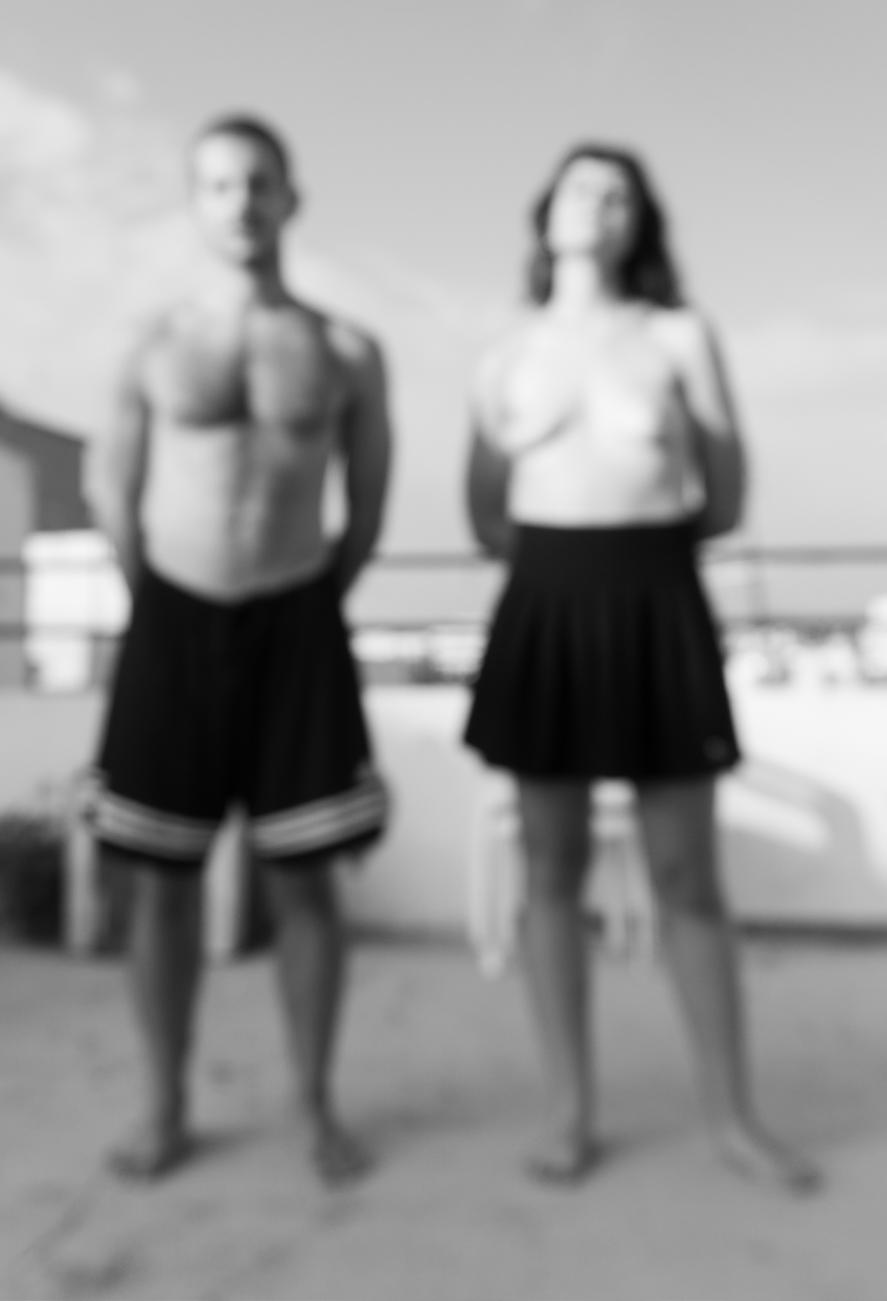
Anna Bellisario, 30 years old from Italy
Carolin Kretzer, 18 years old from Germany
Laura De Cesare, 28 years old from Italy
Şahin Akkaya, 24 years old from Turkey
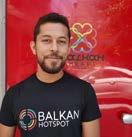

Silvia Sanz Linares, 25 years old from Spain Yusuf Taskiran, 24 years old from Turkey



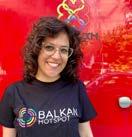





Ana Beatriz Farinha, 23 years old from Portugal


Elizabedi Katcharava, 20 years old from Georgia
Daniela Delgado, 20 years old from Portugal
Eleni Kapnopoulou, 22 years old from Greece
Jessi Kume, 27 years old from Italy
Lilit Gevorgyan, 28 years old from Armenia
Nana Zazadze, 24 years old from Georgia
Madlen Batsiou, 30 years old from Greece
Tatevik Harutyunyan, 23 years old from Armenia
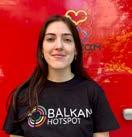

Maria Panicali, 25 years old from Italy

General Directors: Aristodimos Paraschou Christian Cibba Sara Angioletti
Graphic Designer: Anna Maria Diamantidou
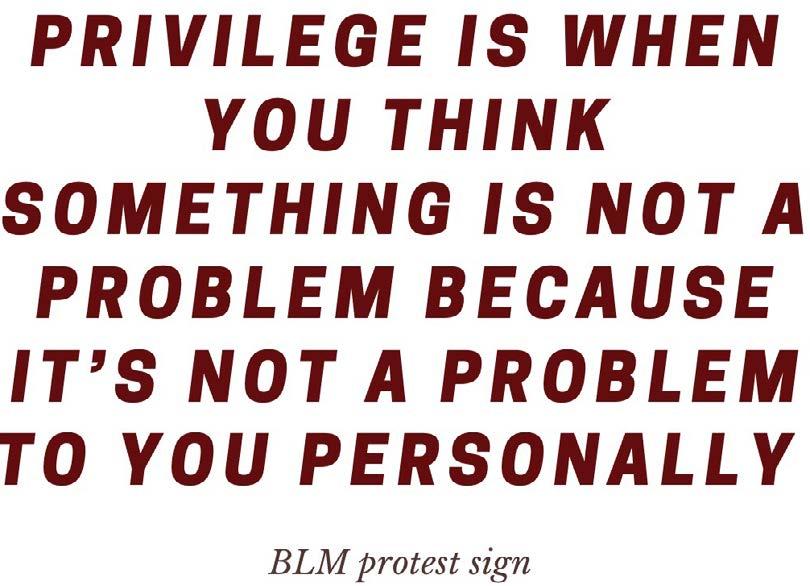
Find us: www.balkanhotspot.org Usb_ngo.gr
Editors: Carolin Kretzer Eleni Kapnopoulou
The volunteers responsible for this publication are hosted in Greece in the framework of the European ERASMUS+ Pro gramme, European Solidarity Corps. This project has been funded with support from the European Commision. This pub lication [communication] reflects the views of only of the au thor, and the Commision can not be held responsible for any use which may be made of the information contained therein.
 © Elisabedi Katcharava
Cover Photo: “Privilege”
© Elisabedi Katcharava
Cover Photo: “Privilege”